I volunteered to help organize my neighbor’s estate sale. But the item she begged me not to sell made me realize her secret life.
I volunteered to help organize my neighbor’s estate sale. But the item she begged me not to sell made me realize her secret life.
The Quiet Woman on Hawthorne Lane
My name is Marjorie, I'm 64, and I've lived on Hawthorne Lane for so long that I've watched three generations grow up, move away, and come back with babies of their own. I know everyone's dog, everyone's preferred coffee order, and every secret feud between neighbors who smile politely at block parties. That's what happens when you've been in one place for decades – you become the unofficial historian of other people's lives. But Edith? She was different. At 82, she lived right next door, sharp as a tack and completely self-sufficient. Not unfriendly, mind you, just... private. The kind of woman who'd bake pies for the church fundraiser but never stay to chat. She'd wave from her garden, ask about my arthritis, then politely retreat back into her tidy little house. For fifteen years, that was our relationship – pleasant but distant. So when her attorney called me last Tuesday, I nearly dropped my phone. "Mrs. Peterson, you were listed as Edith's emergency contact," he said, as if this was the most normal thing in the world. I was speechless. Emergency contact? Me? I didn't even know she had my number written down anywhere. The attorney explained that I needed to help sort through her belongings for the estate sale. "Her niece lives out of state," he said. "Edith trusted you." I agreed, of course. How could I not? But as I hung up the phone, a strange feeling settled over me. After all these years of polite hellos, what else didn't I know about the quiet woman next door?
 Image by RM AI
Image by RM AI
The Estate Sale Begins
I arrived at Edith's house early Saturday morning, armed with sticky notes and a clipboard. The attorney had given me a key, which felt oddly intimate – I'd lived beside this woman for fifteen years but never once stepped inside her home. The house was immaculate, like walking into a time capsule from 1975 that someone dusted daily. Everything – and I mean everything – was labeled in Edith's perfect penmanship. Kitchen drawers had typed inventories taped inside. Photo albums were dated and annotated. Even the linen closet had sheets organized by thread count and purchase date. I ran my fingers along her bookshelf, noticing how the classics were arranged alphabetically, while the mysteries (her guilty pleasure, apparently) were organized by author's last name. For someone who barely invited conversation over the fence, Edith's organizational skills spoke volumes. I found myself pausing at framed photographs – Edith as a young woman standing beside a tall man in uniform, Edith holding a diploma, Edith in front of what looked like the Eiffel Tower. Who was this woman? Certainly not just the quiet neighbor who deadheaded roses and collected her newspaper at exactly 7:15 every morning. I settled at her kitchen table with a notepad, overwhelmed by the task ahead. The estate sale was supposed to be simple: organize, price, sell what her niece didn't want. I thought it would take a weekend at most. But as I looked around at the meticulously kept home of a woman I realized I never really knew, I couldn't shake the feeling that Edith had secrets – and I was about to uncover them all.
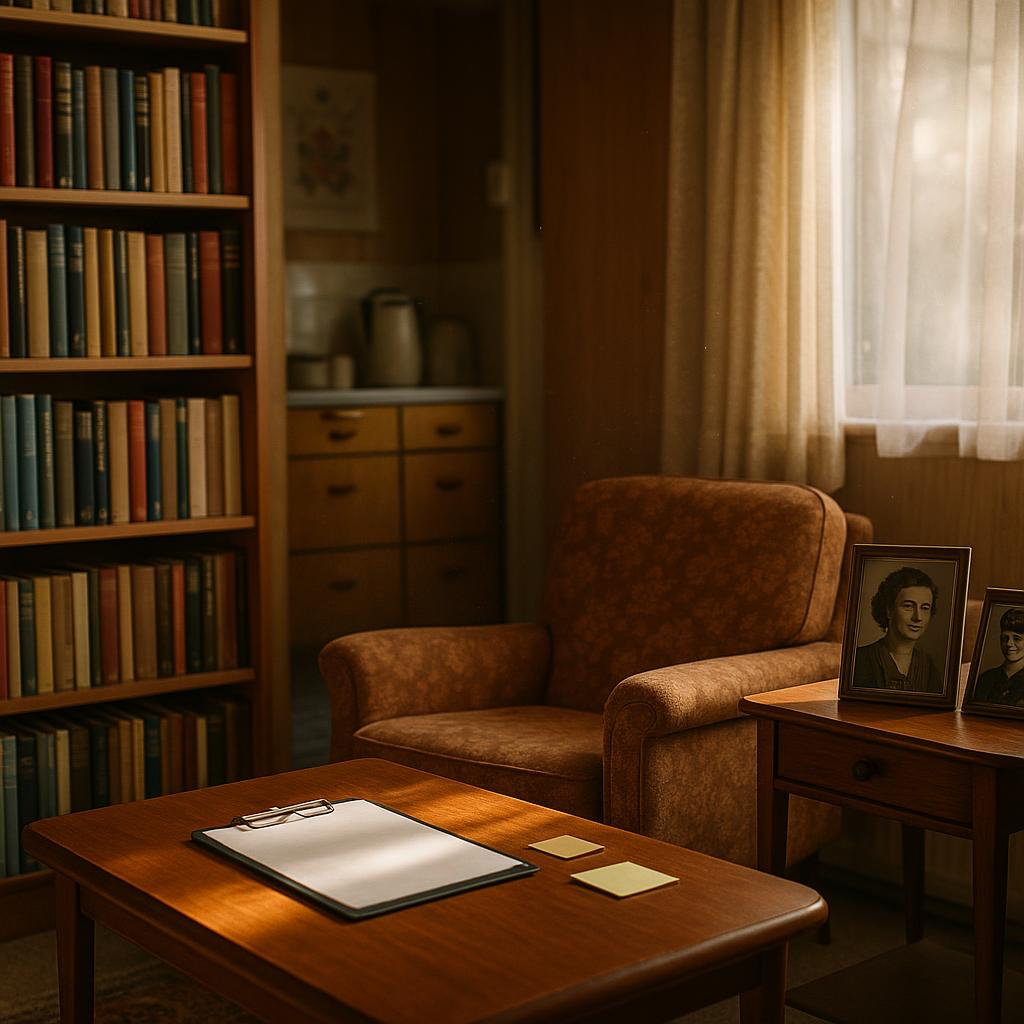 Image by RM AI
Image by RM AI
The Unlabeled Box
By the third day of sorting, I'd developed a rhythm. Kitchen items in the dining room, clothing in the living room, books on the porch. Everything in Edith's house had its place, even in disarray. That's why the unlabeled box stood out like a neon sign in the dark. I found it shoved in the back of her bedroom closet, behind a row of sensible shoes and winter coats. A plain wooden box with a strange brass latch – no tag, no inventory list, nothing. Just when I'd convinced myself Edith was the most methodical person I'd ever known, here was this anomaly. I pulled it out, dust tickling my nose, and noticed her handwriting on a piece of masking tape: "Do NOT sell." The underline was so heavy it had nearly torn through the tape, as if she'd pressed the pen down with unusual force. Almost angrily. I set it on her bed, running my fingers over the smooth wood. What could possibly be inside? Family heirlooms? Love letters? Old photographs too precious to categorize? For a woman who labeled her spice rack in alphabetical order and color-coded her sock drawer, this unmarked box felt like finding a tattoo on a nun. I decided to ask her niece about it when she arrived later – surely family would know what to do with something Edith had specifically marked not to sell. But as I continued organizing, my eyes kept drifting back to that box, like it was quietly humming for attention. Little did I know that opening it would turn my predictable life completely upside down.
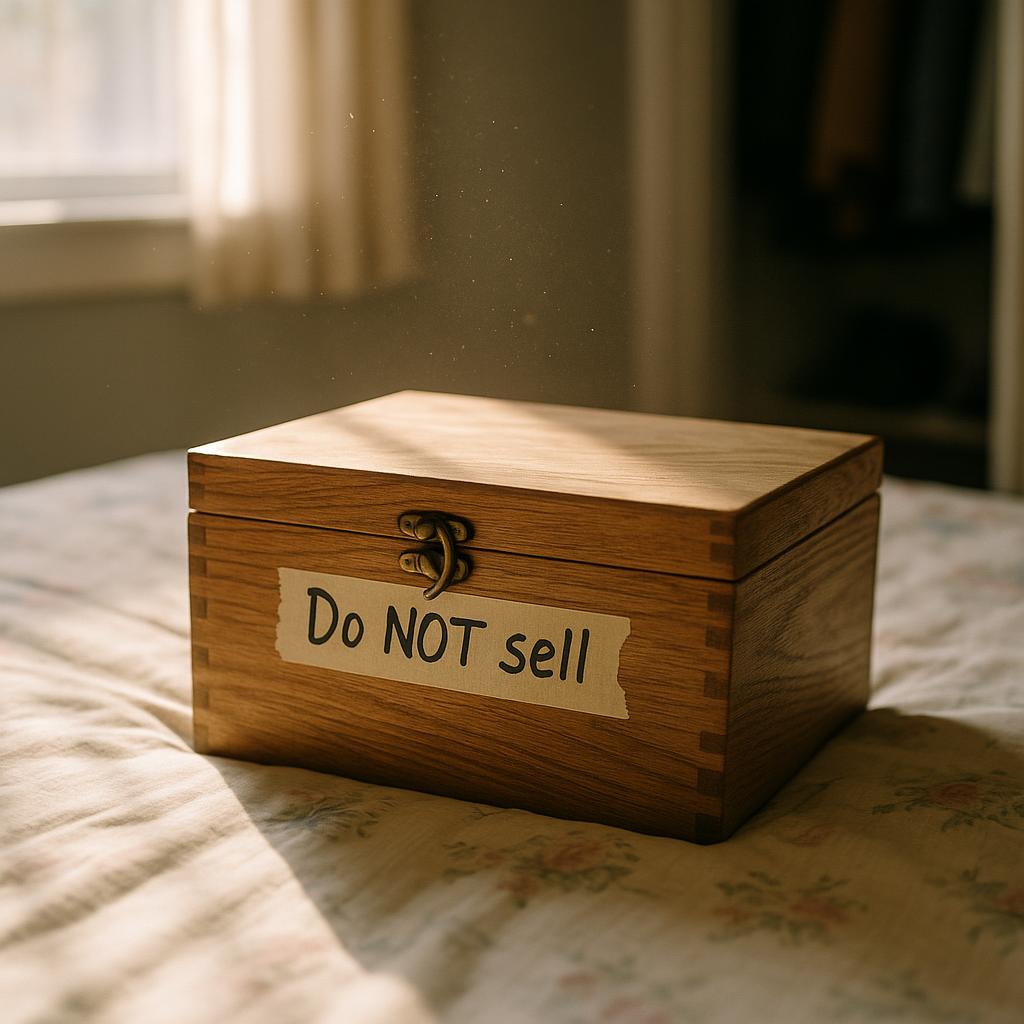 Image by RM AI
Image by RM AI
The Niece's Reaction
Edith's niece arrived around noon, a harried woman in her fifties with Edith's same sharp eyes and no-nonsense posture. She breezed through the house, pointing at furniture and knickknacks she wanted shipped to her home in Arizona. "My aunt was always so... particular," she said, running her finger along a dustless shelf. When I showed her the unlabeled box and mentioned Edith's warning not to sell it, something extraordinary happened. The woman froze like she'd seen a ghost. The color drained from her face, and her hand flew to her throat. "Where did you find that?" she whispered, her voice suddenly thin. When I told her about the closet, she shook her head so quickly her gold earrings swung wildly. "No. I don't want anything to do with it. And neither should you." I tried pressing her – surely she knew what was inside? – but she backed away as if the box might bite. "Some things are better left alone, Mrs. Peterson. That's what Aunt Edith always said." She gathered her purse and car keys, making excuses about a long drive ahead. Ten minutes later, she was gone, leaving me with more questions than answers and a box that suddenly felt heavier in my hands. That night, I couldn't sleep. I kept thinking about the fear in her eyes – not anxiety or worry, but genuine fear. What could possibly be in this ordinary wooden box that would make Edith's own flesh and blood react that way?
 Image by RM AI
Image by RM AI
Opening the Box
That night, I sat at my kitchen table, staring at Edith's mysterious box like it was a ticking bomb. My sensible side said to respect her wishes—DO NOT SELL clearly meant DO NOT OPEN either. But curiosity is a powerful thing, especially at 2 AM when sleep refuses to come. "What's the worst that could happen?" I whispered to my empty kitchen, the kind of question that precedes most terrible decisions. With trembling fingers, I finally unlatched it. Inside was one of the strangest things I'd ever seen: a brass-and-glass device about the size of a grapefruit, with delicate gears and tiny etched markings along its surface. It looked like something steampunk enthusiasts would pay a fortune for—a cross between an antique compass and a clock, but with no hands and no numbers. Just a circular disc that could spin and a small lever on the side. The whole contraption was nestled in faded velvet, alongside several folded pages of handwritten notes in Edith's neat cursive. I lifted the device carefully, surprised by its weight. It felt warm, almost alive in my hands. The notes were even stranger than the device itself. One read: "Test results—successful. But anomaly persists. Must keep it hidden." Another: "If anyone finds this, DO NOT adjust the dial quickly. Changes must be recorded." Changes? Changes to what? The last note was shorter, shakier, as if written with an unsteady hand: "It wasn't supposed to follow me here." I set the device down, a chill running through me despite the warm spring night. Whatever this thing was, Edith had been terrified of it—and now it was sitting on my kitchen table, ticking softly though it had no visible mechanism for making sound.
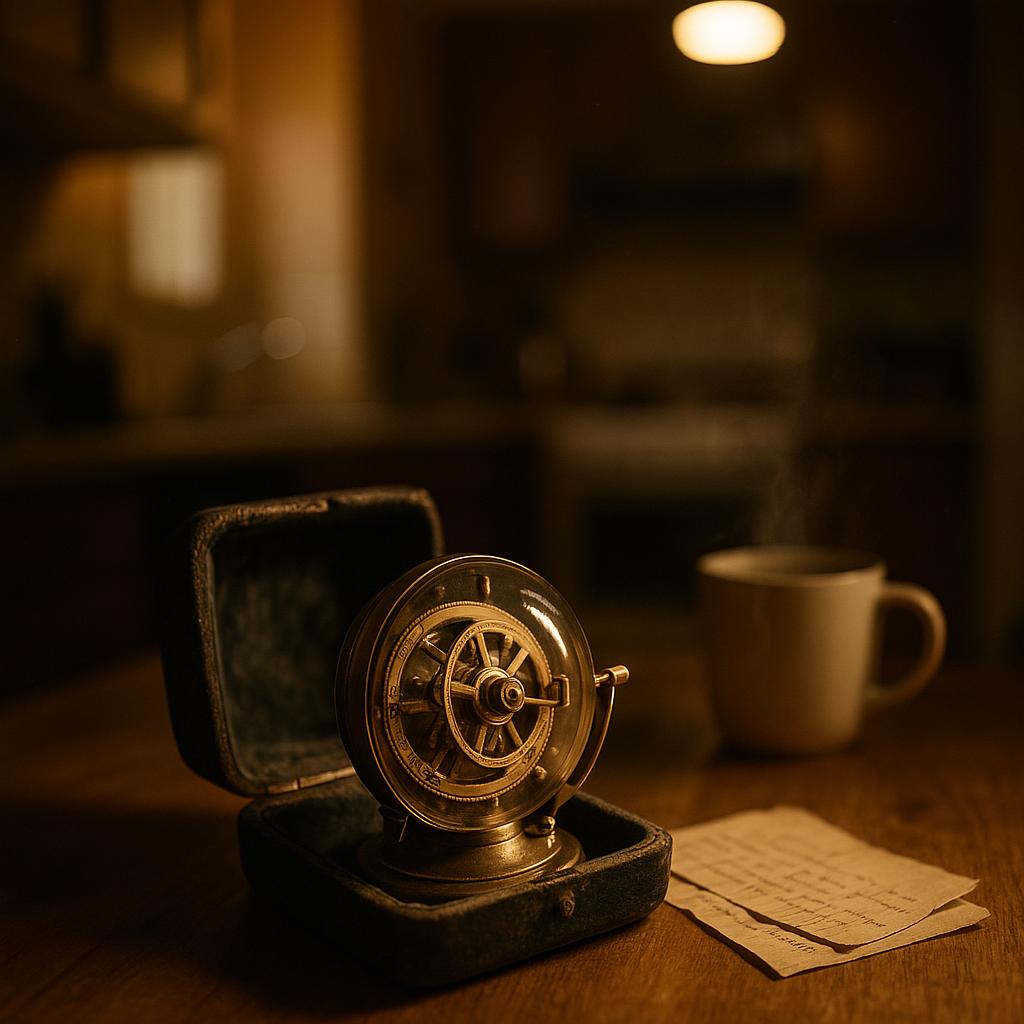 Image by RM AI
Image by RM AI
Edith's Cryptic Notes
I spread Edith's notes across my kitchen table, the yellow light making the faded ink harder to read at this late hour. Her handwriting was meticulous—each letter perfectly formed, except in that final note where the pen seemed to tremble. "Test results—successful. But anomaly persists. Must keep it hidden." What tests? What anomaly? I felt like I'd stumbled into someone's secret laboratory journal. The next note sent a chill down my spine: "If anyone finds this, DO NOT adjust the dial quickly. Changes must be recorded." It was the capital letters that got me—Edith wasn't one for dramatics. Whatever this device did, she'd been methodically documenting its effects. I shuffled through more pages, finding dates going back decades. Some entries mentioned "temporal shifts" and "pattern disruptions." Others contained what looked like mathematical equations far beyond my high school algebra. The most disturbing note was the last one, written in that shaky hand: "It wasn't supposed to follow me here." The words made my skin prickle. Follow her where? From where? I glanced at the brass device sitting innocently on my table, its metal surface reflecting the kitchen light. For the first time since finding it, I wondered if I should have left it locked away. Because whatever Edith had been hiding all these years wasn't just a quirky antique—it was something she'd been running from.
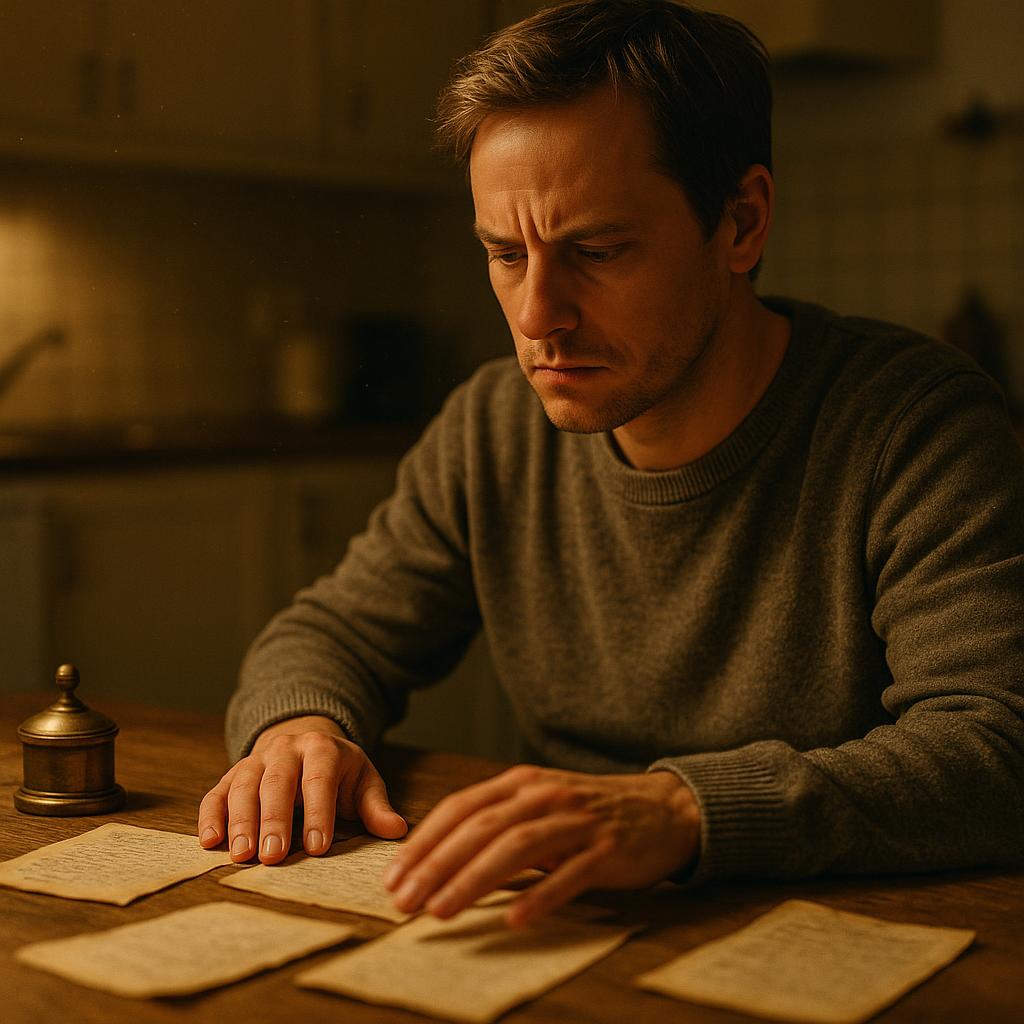 Image by RM AI
Image by RM AI
The Stranger at the Estate Sale
I didn't sleep that night, my mind racing with questions about Edith's strange device. Still, I had to continue with the estate sale as planned. The next morning, I brought the mysterious box with me, quietly tucking it under the main table where I'd be sitting. I couldn't bear to leave it at home, but I wasn't ready to examine it further either. The sale started at 9 AM sharp, with the usual neighborhood vultures descending to pick through Edith's meticulously organized life. Around noon, I noticed him—an older man with silver hair and a tweed jacket that seemed too warm for the season. Unlike the other browsers who flitted from item to item, he moved deliberately, studying each table with unsettling intensity. When he finally approached me, something in his eyes made my stomach clench. "Lovely collection," he remarked casually, his fingers drumming against the edge of my table. "Did Edith happen to leave behind any... instruments?" The word hit me like a slap. I clutched my clipboard tighter, forcing a smile. "Instruments? No, I don't believe so. Just the usual household items." He didn't believe me—I could tell from the way his eyes narrowed slightly. For the next hour, he wandered the house, asking questions that made no sense. Did Edith travel often? Did she have visitors? Did she ever mention "unfinished work"? Each time he circled back to my table, his gaze would drift downward, as if he could somehow sense what was hidden beneath. When I finally managed to usher him toward the exit, he handed me a business card with nothing but a phone number. "If you find anything... unusual," he said, "I'd be very interested." As I watched him walk away, I realized with absolute certainty that whoever this man was, he knew exactly what Edith had been hiding—and he wouldn't stop until he found it.
 Image by RM AI
Image by RM AI
Unwelcome Questions
The man wouldn't leave. He drifted through Edith's living room like a ghost with purpose, picking up photo frames only to set them down slightly out of alignment. It made my skin crawl. "Did Edith ever mention her work in the 1970s?" he asked, studying a bookshelf with unusual intensity. I shook my head, pretending to check my inventory list. "She traveled extensively, I believe," he continued, his voice too casual. "Any journals or logbooks among her things?" Each question felt like he was circling closer to what lay hidden under my table. When he examined the hallway closet—the very one where I'd found the box—I nearly dropped my clipboard. "Sir, we're closing up soon," I announced, my voice steadier than I felt. He smiled, but it never reached his eyes. "Of course, of course." As I walked him to the door, he paused at the threshold. "You know," he said quietly, "Edith wasn't just a neighbor. She was a guardian." The word made my blood run cold. "A guardian of what?" I asked before I could stop myself. His eyes flicked to where the device was hidden, and I knew with absolute certainty he could somehow sense it. "Time has a way of finding its keepers, Mrs. Peterson," he replied. "And now it's found you." He handed me his card before walking away, and I locked the door with shaking hands, wondering how he knew my name when I'd never introduced myself.
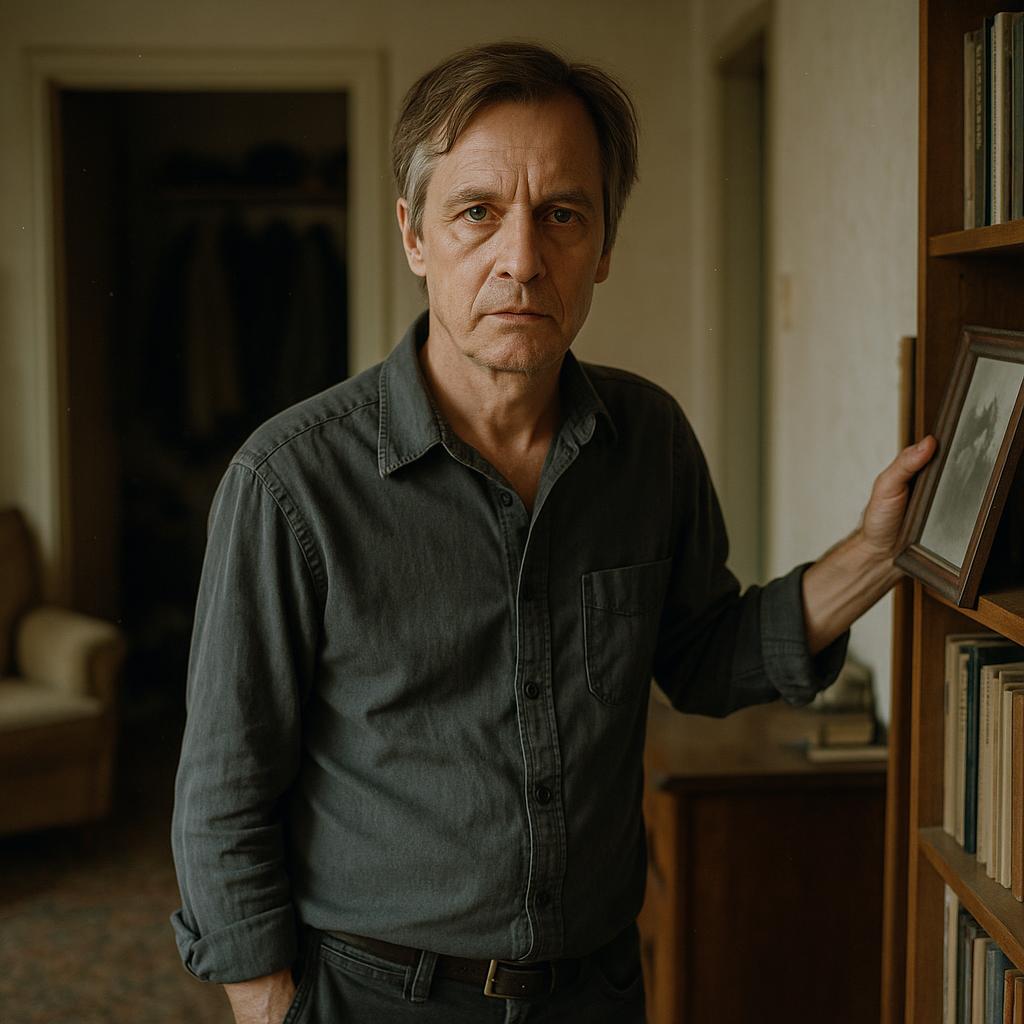 Image by RM AI
Image by RM AI
Deeper Into Edith's Records
That evening, I spread Edith's notes across my dining room table like a detective piecing together a cold case. The pages yellowed with age, some crisp, others soft from handling, created a timeline of... something. I'd expected a few scribbled observations, but what I found was decades—literal decades—of meticulous records. Some entries dated back to 1968, long before she'd moved to Hawthorne Lane. "March 17, 1982: Slight adjustment required. Pattern disruption detected in northeastern quadrant. Synchronization restored but anomaly persists." What on earth was she monitoring? The entries mentioned "temporal shifts" and "recording changes" with the clinical precision of a scientist. Not the ramblings of a confused elderly woman, but the documented research of someone who knew exactly what she was doing. I traced my finger over a diagram she'd drawn—concentric circles with mathematical notations I couldn't begin to understand. The realization hit me like a physical blow: my quiet, pie-baking neighbor had been living a double life right next door to me for fifteen years. She'd wave with gardening gloves while carrying this enormous secret. And now, for reasons I couldn't fathom, she'd passed this burden to me. I glanced at the device sitting on my table, its brass surface catching the lamplight. Was it just me, or was that soft ticking sound getting louder?
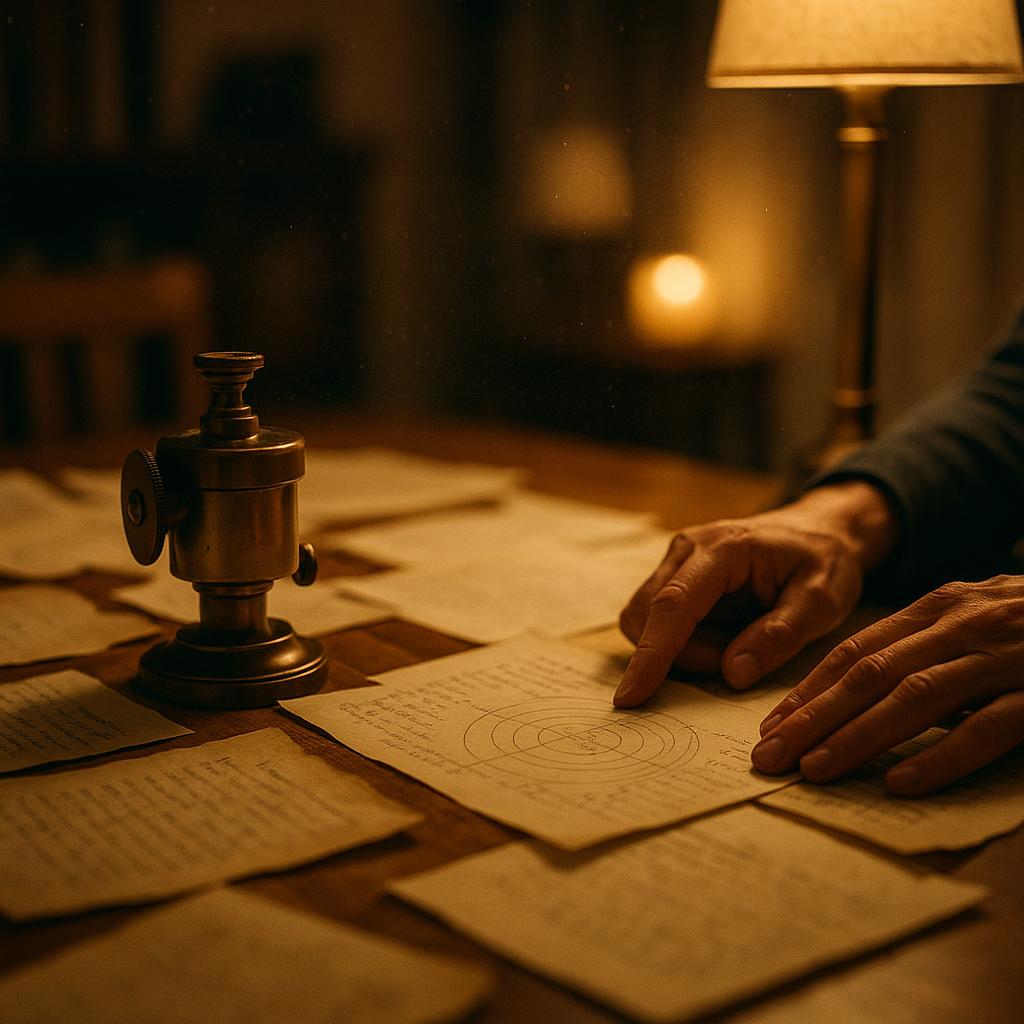 Image by RM AI
Image by RM AI
The First Shift
I couldn't sleep that night, the device calling to me from my bedside table like some forbidden fruit. Around 3 AM, I finally gave in to temptation. "Just a tiny adjustment," I whispered, gently turning the disc a fraction of an inch. Nothing happened—no flash of light, no mysterious hum, nothing you'd expect from a sci-fi movie. Disappointed, I set it down and shuffled to the kitchen for some chamomile tea. That's when I saw it. My wall calendar, the one where I'd meticulously crossed off each day with a red marker. Yesterday, I'd crossed off the 14th—I distinctly remembered because it was my late husband's birthday. But now the 14th was pristine, unmarked. And the 13th had a red X through it instead. I blinked hard, thinking my tired eyes were playing tricks. They weren't. A wave of cold washed over me as I touched the calendar with trembling fingers. The device hadn't done nothing—it had done something impossible. It had moved time backward by exactly one day. I rushed back to my bedroom and stared at the brass contraption, now seeing it for what it truly was: not a weapon, not a toy, but something that altered the very fabric of reality. Edith's warning echoed in my mind: "DO NOT adjust the dial quickly." Now I understood why. This wasn't just some eccentric collector's item—it was a time manipulation device. And if turning it just a hair could rewind an entire day, what would happen if someone turned it all the way around?
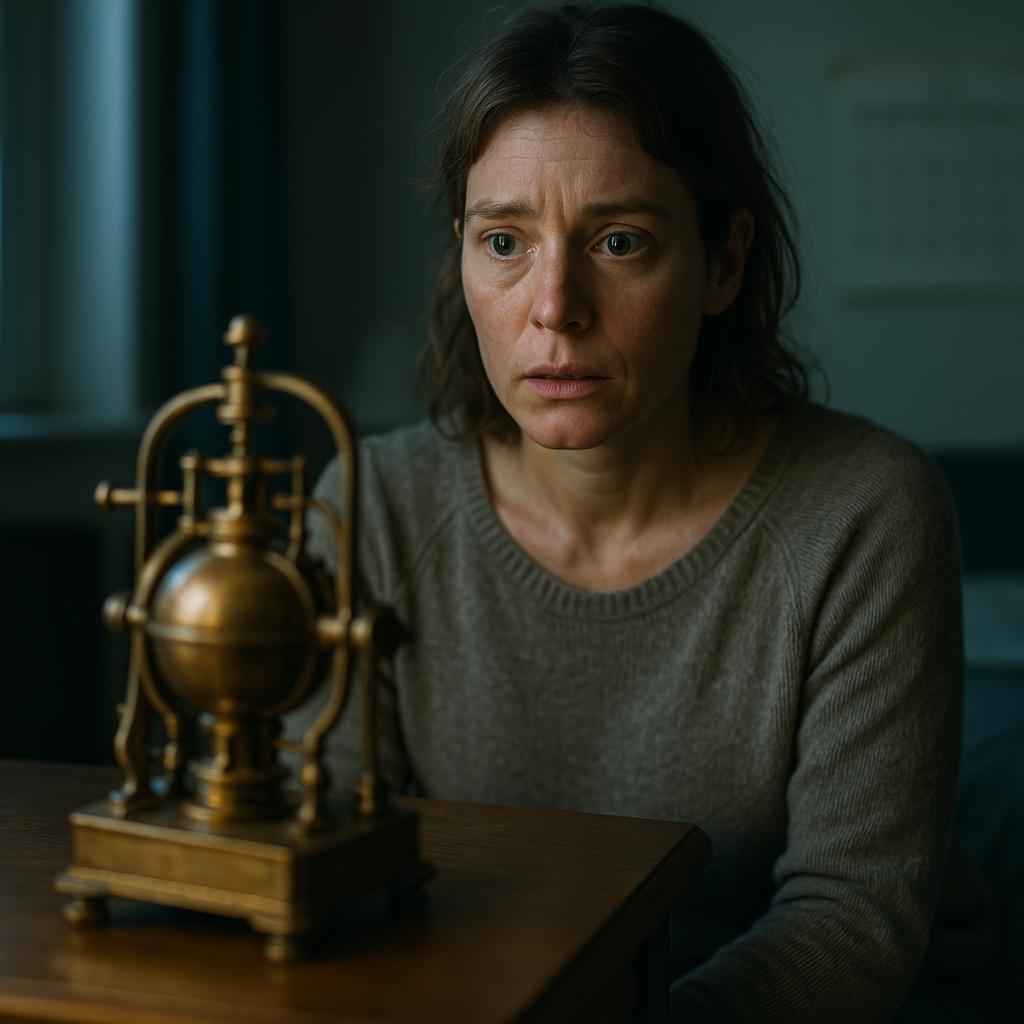 Image by RM AI
Image by RM AI
Testing the Device
I couldn't help myself. With trembling hands, I turned the disc back one more notch, just to be sure I wasn't losing my mind. The calendar flipped again—the 13th now unmarked, the 12th crossed off instead. My heart pounded against my ribs like it was trying to escape. This wasn't a coincidence or a senior moment. This was real. I grabbed Edith's notes and pored over them again, this time with new understanding. "It attached itself to me," she'd written. "Not by choice. By proximity." The device wasn't something she'd built—it had found her, chosen her somehow. And now it had chosen me. I ran my fingers over its brass surface, feeling the warmth that seemed to emanate from within. It wasn't a clock or a compass in any normal sense. It was a delicate, finely tuned index of time alignment, capable of shifting reality one day at a time. Forward or backward. According to Edith's meticulous records, she'd been its reluctant caretaker for over fifty years. Fifty years of secret record-keeping while baking pies and tending roses. Fifty years of hiding this impossible thing from whoever that strange man was. As dawn broke over Hawthorne Lane, I realized with absolute certainty that my quiet, predictable life had ended the moment I opened that box. Because whatever this device was—whatever power it held—it wasn't just an object to be studied. It was alive in some impossible way, and it had transferred its allegiance from Edith to me.
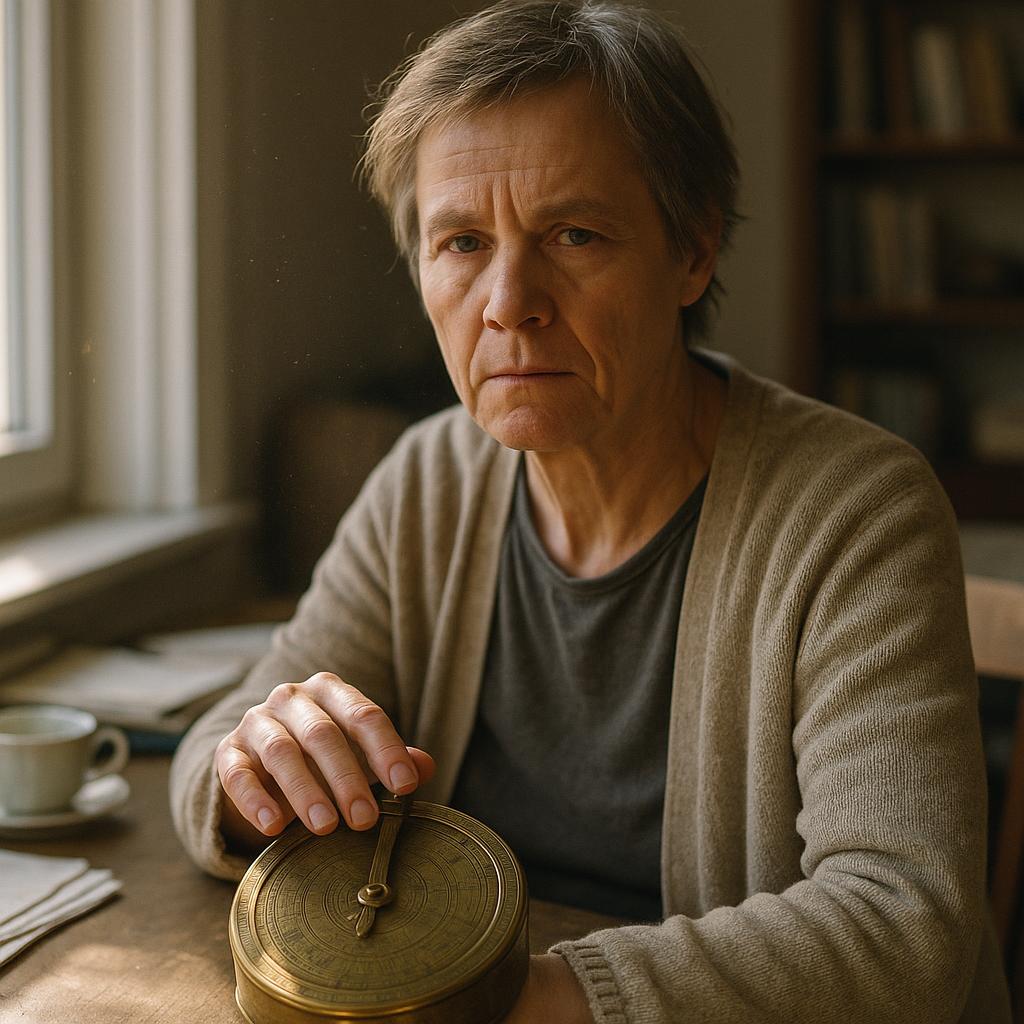 Image by RM AI
Image by RM AI
The Missing Woman
Sunday morning arrived with that familiar church bell chime. I slipped into my usual pew, nodding at familiar faces, when something felt off. Lila's spot—third row, left side, always with her blue hymnal—sat empty. Strange. Lila hadn't missed a Sunday service in fifteen years. During fellowship hour, I casually mentioned her absence to Betty from the choir. "Lila? Who's Lila?" Betty asked, her forehead wrinkling in confusion. I laughed, thinking she was joking. "Lila Matthews. Sits behind the Johnsons. Makes those lemon squares everyone fights over at potlucks." Betty's blank stare sent ice through my veins. One by one, I asked others—Pastor Mike, the Hendersons, even Lila's next-door neighbor. Nobody remembered her. Not a single person. My hands began to shake as I fumbled for my car keys. Yesterday, I'd turned that brass dial. Just a tiny adjustment. Just one notch. And now Lila—vibrant, opinionated, very real Lila—had apparently never existed. I drove home in a daze, Edith's warning echoing in my mind: "Every adjustment requires balance. Something disappears. Something reappears." Dear God, what had I done? And more terrifying still—what else had I changed without realizing it?
 Image by RM AI
Image by RM AI
Balance and Consequences
I raced home, my hands shaking so badly I could barely get the key in the door. Lila—gone. Not dead, not moved away—GONE, as if she'd never existed. I spread Edith's notes across my kitchen table, frantically scanning for answers. One line jumped out at me like it was written in neon: 'Every adjustment requires balance. Something disappears. Something reappears. It cannot stay dormant forever.' My stomach dropped to my feet. This wasn't just some quirky antique; this was a cosmic balancing scale. I'd turned the dial, and the universe had taken Lila as payment. I grabbed my phone, scrolling through contacts—no Lila. Checked Facebook—no profile. Even the church directory from last year showed an empty space where her photo should have been. What else had changed that I hadn't noticed yet? Were there people in my life now who hadn't existed before? The thought made me dizzy. I poured myself a stiff drink—something I rarely did—and stared at the device sitting innocently on my table. 'What have I done?' I whispered to my empty kitchen. The worst part wasn't just that I'd apparently erased someone from existence—it was realizing that I alone remembered her. I was the only proof Lila Matthews had ever lived, laughed, or baked those famous lemon squares. And if I kept using this thing, who else might disappear next? Or worse yet—what might suddenly appear?
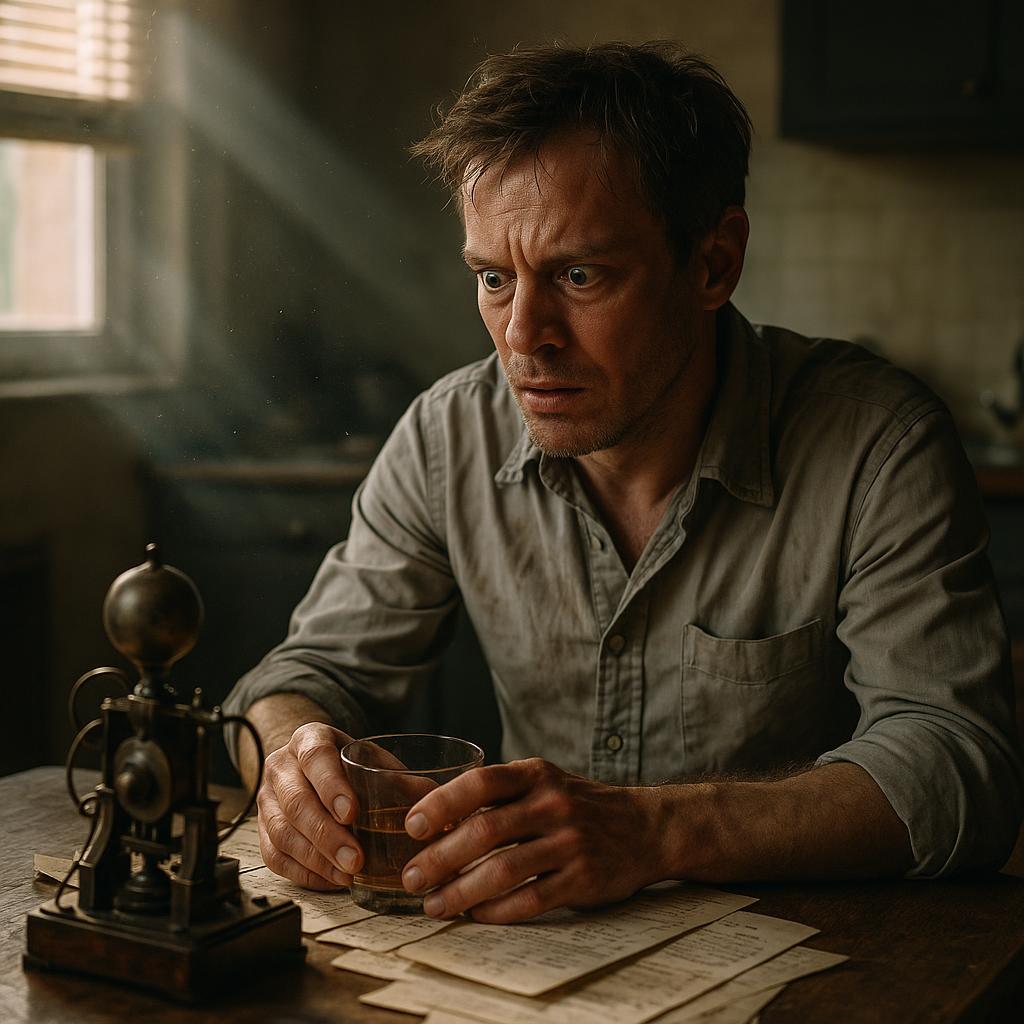 Image by RM AI
Image by RM AI
The Watcher Returns
Tuesday morning, I was watering my petunias when I spotted him—the silver-haired man from the estate sale, standing motionless across the street. Not hiding, not pretending to do anything else. Just... watching my house. I ducked inside, heart hammering against my ribs. For three days straight, he returned. Sometimes morning, sometimes evening, always in that same tweed jacket despite the June heat. He never approached, never knocked—just stood there like some human surveillance camera. I started keeping all my curtains closed, feeling like a prisoner in my own home. "This is ridiculous," I told myself on day four, peeking through the blinds. "I'm 64 years old, not some scared teenager." But something about his stillness, the patient certainty in his posture, sent chills through me. I called Patty from book club, who agreed to come over with her husband's binoculars. "My God," she whispered, focusing on him. "It's like he's waiting for something." That's when it hit me—Edith hadn't been merely private all these years. She'd been hiding. The carefully neutral conversations, the polite deflections whenever anyone asked about her past, the way she never invited anyone inside except for church functions. She'd been protecting herself from someone. And now, with that brass device sitting in my kitchen drawer, that someone was watching me instead.
 Image by RM AI
Image by RM AI
Calling for Help
I couldn't handle this alone anymore. After four nights of barely sleeping, jumping at every creak in my old house, I called Patty. She's what my mother would have called a 'busybody,' but she's also fiercely loyal and smarter than most give her credit for. "Patty," I whispered into the phone, as if the silver-haired man might somehow be listening, "I need your help with something... unusual." I didn't tell her everything—how could I explain that I'd apparently erased a woman from existence?—but I mentioned finding a strange scientific device among Edith's things and a man who seemed obsessed with obtaining it. "And you think this is connected to Edith somehow?" she asked, skepticism heavy in her voice. "I know it sounds crazy," I admitted, "but I need to understand what this thing is. Can you help me research old scientific instruments? Maybe temporal theories?" There was a long pause, and I was sure she was going to suggest I see a doctor. Instead, she sighed. "Meet me at the library tomorrow at 10. I volunteer in the reference section on Thursdays, and we just got those new computers with the fancy internet search." I nearly cried with relief. "Thank you, Patty." After hanging up, I glanced at the device sitting on my kitchen table. For the first time since opening that box, I didn't feel completely alone. What I didn't know then was that asking for help would pull Patty into a danger I was only beginning to understand.
 Image by RM AI
Image by RM AI
Research at the Library
The next morning, Patty met me at the library as promised, her reading glasses perched on her nose and a determined look on her face. "I pulled some reference materials already," she whispered, leading me to a back table stacked with dusty volumes. For hours, we pored over century-old science journals and obscure academic papers, our fingers turning brittle yellow pages filled with theories that sounded more like science fiction than reality. "Look at this," Patty said, sliding a faded article toward me. It described a researcher named Dr. Elias Whitmore who had disappeared in 1937 after claiming he could "measure time differently than conventional clocks." The accompanying photo made my blood run cold—standing behind Whitmore was a man who looked exactly like my silver-haired watcher. Same face. Same penetrating eyes. "That's impossible," I whispered, my finger trembling as I pointed to the figure. "This photo is over 80 years old." We found more references: a physicist in 1892 who documented "temporal anomalies" before being committed to an asylum; a clockmaker in Vienna who claimed his instruments could "realign disrupted time patterns." All of them had disappeared or been discredited. And in three separate photographs spanning a century, that same silver-haired man appeared, unchanged. He wasn't just someone who had worked with Edith—he was someone who had been hunting this device for generations. The realization hit me like a physical blow: Edith hadn't just been hiding an object. She'd been hiding from him. And now, I was his new target.
 Image by RM AI
Image by RM AI
The Vanished Researcher
The library's microfiche machine hummed as Patty loaded another reel of archived scientific journals. 'Marjorie, look at this,' she whispered, her finger tapping excitedly on the screen. The headline read: 'Local Physicist Missing After Controversial Time Theory Presentation.' The article, dated 1937, described Dr. Elias Whitmore, who had vanished without a trace after claiming he could 'measure time differently than conventional clocks.' What made my hands tremble wasn't the eerie similarity to Edith's device—it was the photograph accompanying the article. Standing behind Whitmore, partially obscured but unmistakable, was my silver-haired watcher. Same penetrating eyes. Same austere expression. Same everything. 'That's impossible,' I whispered, my voice barely audible. 'This photo is over 80 years old.' Patty adjusted her reading glasses, squinting at the image. 'Could be a relative? Family resemblance?' But as we dug deeper, finding references to similar researchers across decades—all who had mysteriously disappeared—the same man appeared in photographs spanning nearly a century. Always watching. Always in the background. Never aging a day. The realization hit me like a physical blow: this wasn't just some collector after Edith's antique. This was someone—or something—that had been hunting this device for generations. And now that Edith was gone, he had set his sights on me.
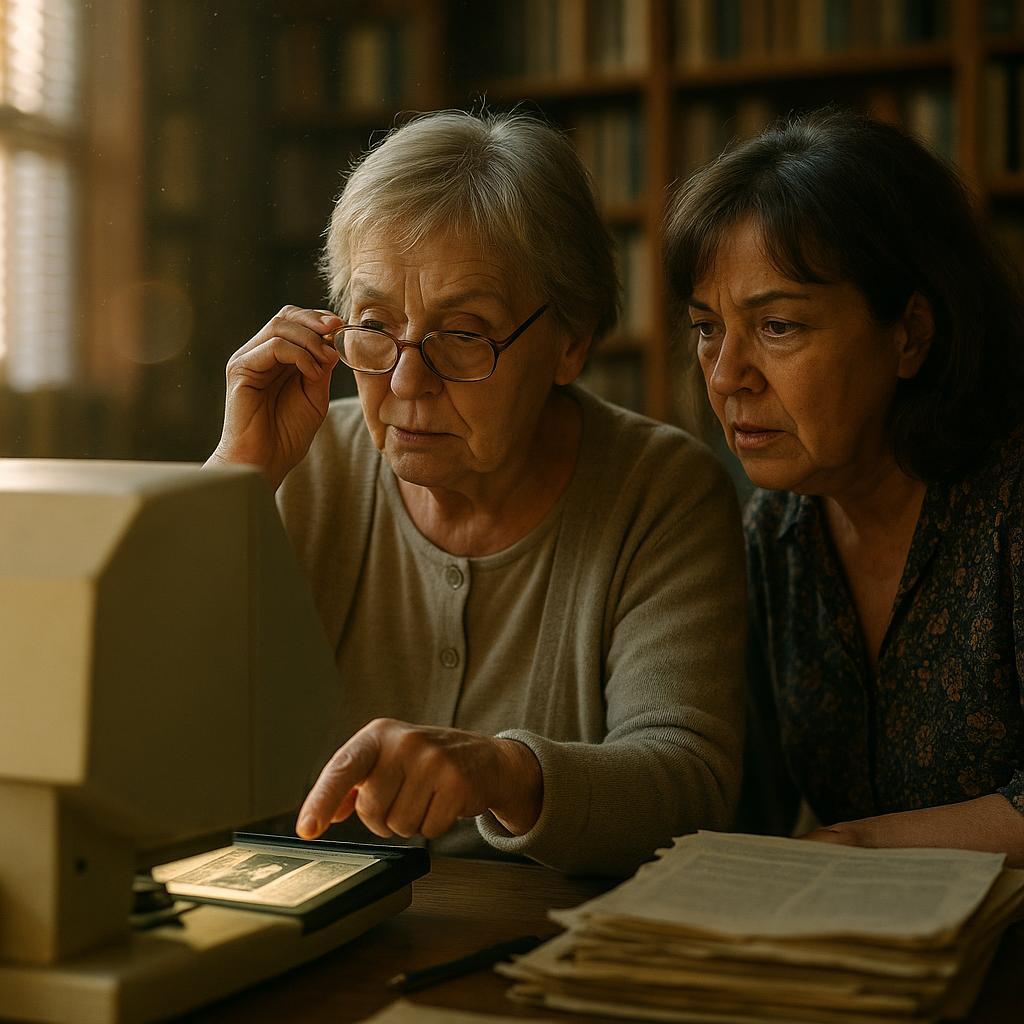 Image by RM AI
Image by RM AI
Patty's Skepticism
As we stepped out of the library into the bright afternoon sun, Patty's face was pinched with skepticism. 'Marjorie,' she said, adjusting her purse strap nervously, 'don't you think we're getting carried away? That man in the photos could be three different people who just look similar. And all this time travel nonsense...' She waved her hand dismissively. I started to explain that I had actual proof—that I'd seen the device work with my own eyes—but something in her expression stopped me. The moment I hinted that I might actually possess Edith's mysterious contraption, Patty's eyes widened and she suddenly remembered she needed to pick up dry cleaning before 5. 'Let's talk about something else,' she said too brightly, launching into a story about her grandson's soccer game. I nodded and smiled, but my heart sank. If Patty—loyal, curious Patty who'd spent hours helping me research—couldn't handle the truth, who could? Walking home alone, I felt the weight of isolation settling over me like a heavy blanket. The device in my purse seemed to grow heavier with each step. Edith had carried this secret alone for decades. Now I understood why. Some truths are too strange, too dangerous to share—even with those we trust most. And as I rounded the corner to Hawthorne Lane, I realized with a chill that the silver-haired man was standing directly in front of my house, no longer content to watch from across the street.
 Image by RM AI
Image by RM AI
Controlled Experiments
I needed to understand this thing methodically, not just fumble around in the dark. So I cleared off my dining room table, set up a proper notebook, and started treating this like the scientific experiment it deserved to be. "If Edith could do this for decades, I can at least be systematic," I muttered to myself. Each morning, I'd make a tiny adjustment—just a hair's breadth turn of the dial—then document everything: the date on my calendar, headlines in the newspaper, even the weather forecast. The changes were subtle but undeniable. Tuesday's thunderstorm prediction became Wednesday's, then disappeared altogether. A local robbery reported on page three vanished, replaced by a story about a community garden I'd never heard of. Most disturbing were the phone calls—people I barely knew suddenly acting like we'd spoken recently, referencing conversations we'd never had. I started photographing my journal pages, afraid they too might change retroactively. One particularly unsettling discovery came when I turned the dial forward instead of backward—my neighbor's cat, who'd died last month, was suddenly alive again, sunning himself on their porch swing. The implications were staggering. This wasn't just moving through time—it was rewriting reality itself. And with each adjustment, I couldn't shake the feeling that something was watching me make these changes, something beyond just that silver-haired man.
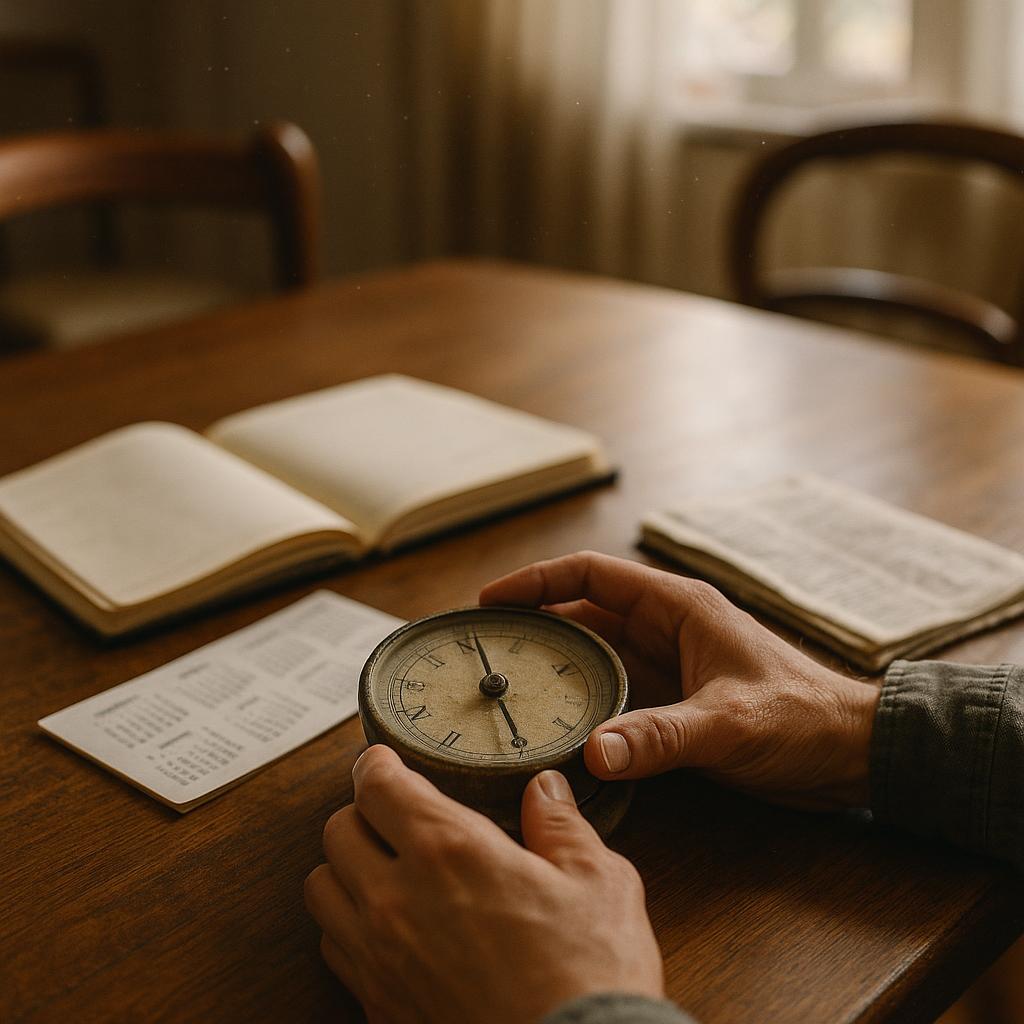 Image by RM AI
Image by RM AI
The Unexpected Call
The phone rang at 9:30 AM, startling me as I was documenting another small shift in my journal. The caller ID showed 'Elaine Winters.' I frowned, trying to place the name—a distant cousin from my mother's side who I hadn't spoken to in at least fifteen years. 'Marjorie! I've been thinking about our conversation last week,' she gushed when I answered. My stomach dropped as she continued, 'I've already booked that B&B in Vermont we talked about for the fall foliage trip. You were right about getting reservations early!' I found myself nodding along, making appropriate sounds of agreement while my mind raced. What fall foliage trip? What conversation last week? We hadn't spoken since my mother's funeral. 'And I found that book you recommended—absolutely loving it!' she added cheerfully. After twenty excruciating minutes of pretending I knew what she was talking about, I hung up and immediately flipped through my journal. There it was—yesterday I'd turned the dial forward one notch. In this new reality, apparently Elaine and I had rekindled our relationship and were now travel buddies planning autumn getaways together. I sat at my kitchen table, hands trembling. The device wasn't just changing events or objects—it was rewriting relationships, creating memories for everyone except me. I was the only one who knew these connections weren't real, that they'd been manufactured by a brass contraption that shouldn't exist. And the most terrifying thought of all: what if one day, I turned that dial and forgot too?
 Image by RM AI
Image by RM AI
Neighborhood Changes
I decided to take a walk down Hawthorne Lane yesterday, hoping the fresh air might clear my head after all this device business. That's when I noticed it—little things at first, like the Petersons' house. Wasn't it blue last week? Now it's a soft yellow with white trim. I stopped, blinking hard, wondering if my memory was finally giving out after 64 years. Then there was Mrs. Calloway's front yard. I could have sworn she had a circular driveway, but now there's an elaborate rose garden where cars should be parked. "Marjorie!" called Tom from across the street, waving enthusiastically. "All set for the block party this weekend? The committee loved your idea about the potluck contest!" I nodded and smiled, having absolutely no recollection of suggesting anything of the sort. As I continued walking, more discrepancies appeared—a stop sign where I remembered a yield, a small playground I'd never seen before at the end of the cul-de-sac. My stomach knotted as I realized what was happening. The device wasn't just changing individual events or people—it was gradually reshaping the entire fabric of my reality. The most terrifying part? I was the only one who noticed. Everyone else was living in this adjusted timeline as if it had always been this way. How many more turns of that dial before I wouldn't recognize Hawthorne Lane at all? Or worse yet—before I wouldn't remember what it used to look like?
 Image by RM AI
Image by RM AI
The Hidden Compartment
After a sleepless night filled with nightmares about disappearing neighbors and watching strangers, I found myself staring at Edith's wooden box again. Something about it seemed off—the dimensions didn't quite match up. I ran my fingers along the edges, pressing gently until I heard a soft click. The bottom panel slid away, revealing a hidden compartment I'd completely missed. My heart raced as I pulled out a yellowed envelope. Inside was one final note in Edith's familiar handwriting, but shakier than the others, as if written when her hands were trembling: 'It won't stop on its own. Someone must reset the balance entirely. If you're reading this, it chose you next.' I dropped the paper like it had burned me. Chose me? Like some cosmic game of tag where I was 'it'? I didn't want this responsibility. I wanted book club meetings and Sunday services and predictable days where neighbors stayed exactly where they belonged—in existence. The device hadn't just fallen into my hands by accident. According to Edith, it had selected me, whatever that meant. And now I was supposed to 'reset the balance'? I had no idea what that entailed, but the word 'entirely' sent chills down my spine. It sounded permanent. It sounded dangerous. And worst of all, it sounded like something I couldn't ignore much longer—not with reality unraveling around me one dial turn at a time.
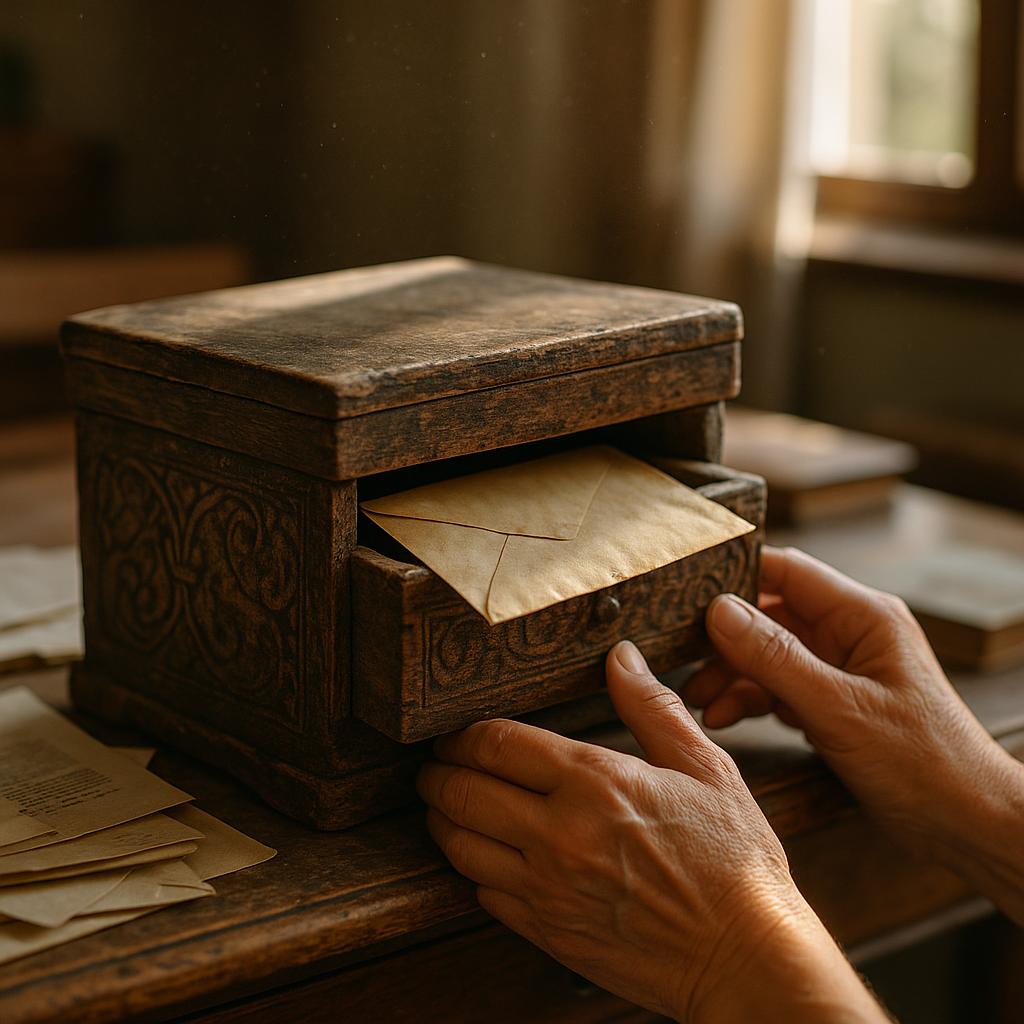 Image by RM AI
Image by RM AI
Stalked
He's everywhere now. Yesterday, I spotted him lingering by the frozen foods at Kroger, pretending to compare prices on TV dinners while watching me from the corner of his eye. This morning, he was parked across from the post office when I mailed Patty a thank-you card for her help. By afternoon, his silver sedan had cruised past my house four times—slow enough that I could count the seconds between his appearance and disappearance. It's like living in one of those psychological thrillers where the protagonist thinks she's going crazy, except I know I'm not. I finally snapped today and marched straight toward him when I spotted him at the pharmacy. "Who are you?" I called out, my voice shakier than I'd intended. But by the time I reached the spot where he'd been standing, he'd vanished—like smoke. Not just walked away quickly, but completely disappeared. The pharmacist swore no one matching his description had been there at all. I'm starting to understand why Edith kept to herself all these years. This wasn't just privacy—it was survival. She'd been hunted, just as I am now. The device sits in my kitchen drawer, ticking softly like a bomb waiting to detonate, while a man who shouldn't exist watches my every move. What terrifies me most isn't just his constant surveillance—it's the growing certainty that he's waiting for me to make a mistake.
 Image by RM AI
Image by RM AI
Lila Returns
I was reaching for a box of cereal in aisle three when I heard a familiar voice call my name. 'Marjorie! How have you been?' I turned around and nearly dropped my shopping basket. There stood Lila—the same Lila who had vanished from everyone's memories after my first experiment with Edith's device. My hands started trembling as she approached, smiling warmly like nothing had ever happened. 'I haven't seen you since book club last week,' she continued, completely unaware she'd been erased from existence. I managed to stammer something about being busy, then mentioned, 'I missed you at church on Sunday.' Lila's brow furrowed in confusion. 'What do you mean? I was there in my usual spot, third pew from the front. We even chatted about Pastor Mike's sermon afterward.' My blood ran cold. In my reality, I'd spent Sunday frantically searching for any trace of her, while everyone else insisted they'd never heard of a 'Lila' in our congregation. Yet here she stood, flesh and blood, with memories of conversations we never had. The device hadn't just erased her—it had created a parallel track of reality where she continued to exist, completely separate from mine. As we parted ways with promises to catch up soon, I realized with growing horror that I was becoming untethered from the shared reality everyone else inhabited. How many more turns of that dial before I became a ghost in my own life, remembering things no one else could see?
 Image by RM AI
Image by RM AI
The Accelerating Effect
Last night, I woke up at 3:17 AM to a strange amber glow coming from my nightstand. The device—Edith's cursed inheritance to me—was illuminating my bedroom with a soft, pulsating light. I'd never seen it do that before, and nothing in Edith's meticulous notes mentioned any luminescence. My first instinct was to shove it in a drawer, but something held me back. I watched, transfixed, as the brass components seemed to breathe with an internal energy. This morning, things got worse. I noticed my wall calendar flickering between states—Tuesday's dental appointment appearing, disappearing, then reappearing again without me touching the dial. The pages of my journal, where I'd been documenting every change, started rearranging themselves. Entries from last week suddenly appeared dated months ago. I dropped my coffee mug watching the ink literally crawl across the paper, reforming into words I never wrote. The device is becoming active on its own, like a hibernating creature slowly waking up. Whatever dormant state it maintained during Edith's final years seems to be ending. I'm terrified to think what this means—that I'm losing what little control I had over this thing. The silver-haired man must sense it too. He's watching my house more intently now, his eyes following the windows where the glow would be visible at night. I've started covering the device with a thick blanket, but I swear I can still see that amber light seeping through the fabric, growing stronger each night.
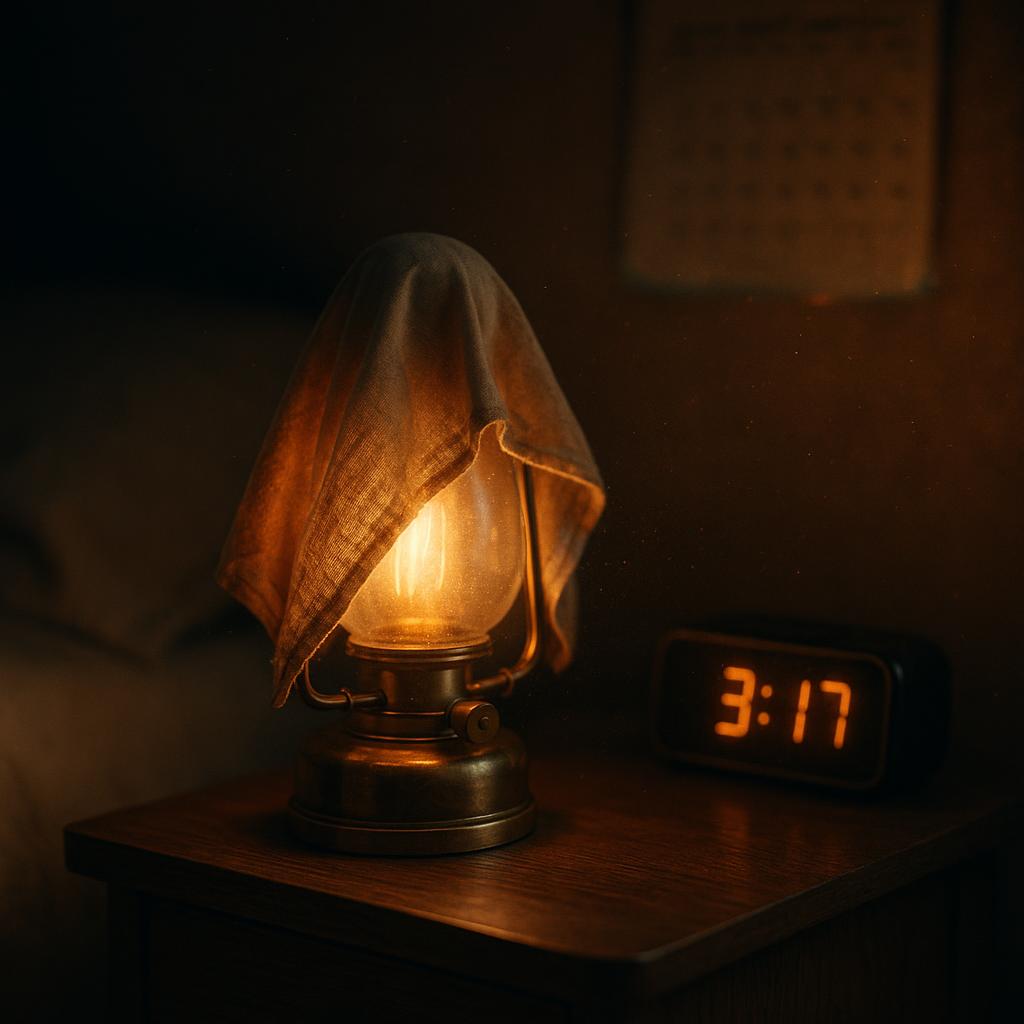 Image by RM AI
Image by RM AI
Patty's Transformation
Patty came over for tea yesterday, and I swear it was like talking to a completely different person. She waltzed into my living room, glanced at the device sitting on my coffee table, and didn't bat an eye. 'Oh, Edith showed me that once,' she said casually, as if this wasn't earth-shattering information. I nearly choked on my chamomile. Patty had been skeptical about the whole thing just days ago, and now she was claiming Edith had been her confidante? 'Remember when we took that day trip to the antique fair in Springfield?' she asked, stirring sugar into her cup. 'Edith found that brass music box that matched her device?' I nodded weakly, though no such trip had ever happened in my reality. When I pulled out a photo from last Christmas party at the community center, hoping to ground myself, Patty pointed to a woman standing between us with silver-streaked hair and a purple cardigan. 'Janet looks so good here,' she said. 'I miss her chocolate rum balls.' I stared at the stranger in the photo—a woman who hadn't been there when the picture was taken, a woman I'd never met. My hands trembled as I set the photo down. The timeline wasn't just shifting small details anymore; it was rewriting entire relationships, creating shared histories that never existed. And the terrifying part? Patty remembered it all as if it had always been that way. What happens when I'm the only one who remembers the world as it was, while everyone else lives in a reality I no longer recognize?
 Image by RM AI
Image by RM AI
Confrontation at the Church
I was folding my church bulletin into my purse when I felt it—that familiar prickle at the back of my neck. He was watching me again. I'd managed to avoid him throughout the service, pretending to be deeply engrossed in Pastor Mike's sermon about faith in uncertain times (which felt a little too on-the-nose for my situation). But now, as parishioners scattered to their cars in the parking lot, there was nowhere to hide. He approached with purposeful strides, silver hair catching the midday sun. 'Mrs. Marjorie Winters?' His voice was surprisingly gentle for someone who'd been stalking me for weeks. 'My name is Thorne.' He extended his hand, which I reluctantly shook. 'I've been monitoring temporal anomalies in this area.' My heart nearly stopped. He said it so casually, like he was commenting on the weather instead of confirming my worst fears. 'I don't know what you're talking about,' I replied, fumbling with my car keys. His smile never reached his eyes. 'I believe you came into possession of certain items from Edith Blackwood's estate. Anything... unusual?' The way he emphasized 'unusual' made my skin crawl. 'Just some old books and kitchenware,' I lied, avoiding his gaze. 'Nothing special.' He chuckled softly, a sound that chilled me despite the warm spring day. 'Mrs. Winters, we both know that's not true.' He leaned closer, lowering his voice. 'The device is active again. I can feel it. And so can you.' Before I could respond, Patty called my name from across the lot, waving enthusiastically. Thorne straightened, his expression instantly transforming into that of a casual churchgoer. 'We'll continue this conversation soon,' he promised, then walked away as if we'd been discussing nothing more serious than the church bake sale. But the look he gave me over his shoulder told me everything: he wasn't just watching anymore—he was making his move.
 Image by RM AI
Image by RM AI
Thorne's Warning
I barely made it to my car before Thorne caught up, his silver hair gleaming under the church parking lot lights. 'Mrs. Winters,' he said, his voice low but urgent, 'amateur manipulation of chronological fields is extraordinarily dangerous.' The way he said it—so matter-of-fact—sent chills down my spine. He positioned himself between me and my driver's door, not threatening exactly, but definitely blocking my escape. 'I represent a specialized group that monitors these devices,' he continued, his eyes never leaving mine. 'We've been tracking temporal anomalies in this area for months now.' He extended his hand, palm up. 'You need to surrender anything unusual you found among Edith's possessions. Immediately.' I clutched my purse tighter, feeling the weight of the device inside. Something about his intensity felt wrong—not like someone concerned about safety, but like a collector desperate for a rare find. His eyes had that gleam I'd seen in antique dealers when they spot something valuable. 'I don't know what you're talking about,' I lied, fumbling with my keys. He smiled thinly. 'Mrs. Winters, people who don't understand what they're dealing with often cause irreparable damage to the timeline.' I finally managed to unlock my car and slipped inside, locking the door immediately. As I pulled away, I watched him growing smaller in my rearview mirror, standing perfectly still in the middle of the lot. He didn't look angry or frustrated that I'd escaped—he looked patient, like a man who had all the time in the world. And maybe, I realized with growing dread, that was exactly what he had.
 Image by RM AI
Image by RM AI
Breaking Into Edith's House
I don't know what possessed me to return to Edith's house. Maybe it was desperation, or maybe the device was somehow pulling me back there. The place stood empty now, a hollow shell after the estate sale, with that peculiar stillness that only abandoned homes possess. I still had the spare key—the attorney never asked for it back. My footsteps echoed through the empty rooms as I searched areas we hadn't properly cleared out during the sale. The attic yielded nothing but dust and forgotten Christmas decorations. The crawlspace under the stairs contained only cobwebs and a single child's shoe that made my skin crawl for reasons I couldn't explain. It was in the basement where I finally found something. I was running my fingers along the old brick wall when I felt it—a loose brick that wiggled under my touch. My heart raced as I carefully worked it free, revealing a small hollow space behind it. Inside was a leather-bound journal, its pages yellowed with age. The first entry was dated June 17, 1962. 'Today I acquired the device,' Edith had written in handwriting far steadier than her later notes. 'The old man warned me it would change my life. I laughed then. I'm not laughing now.' I clutched the journal to my chest, feeling like I'd found buried treasure and a ticking bomb all at once. Whatever journey Edith had been on with this cursed object had started right here, sixty years ago. And now, for better or worse, I was following in her footsteps.
 Image by RM AI
Image by RM AI
Edith's Origin Story
I spent the entire night reading Edith's journal, my hands trembling with each page turn. The truth was more incredible than I could have imagined. In 1962, Edith wasn't just a quiet church lady—she was Dr. Edith Blackwood, a brilliant museum curator specializing in scientific antiquities. She'd been working at a prestigious museum in Geneva when a collection arrived from an abandoned laboratory in the Swiss Alps. 'The device was unmarked,' she wrote, 'sitting among ordinary measuring instruments as if it belonged there.' Her initial entries were filled with academic excitement, documenting tests and observations. Then the tone shifted dramatically. 'March 3, 1963: I've noticed discrepancies in my daily routine. My red teacup is now blue. My colleague Thomas insists we never hired an assistant named Claire, though she's worked with us for months.' By 1965, panic had set in. 'He's found me again. Silver hair, ageless face. He watches from across the street, pretending to read newspapers.' The next entry was postmarked from America. 'I've changed my name slightly. Purchased a modest home on Hawthorne Lane. Perhaps here, I can finally disappear.' My blood ran cold reading those words. Edith hadn't randomly moved to our quiet street—she'd been running from Thorne for over fifty years, hiding in plain sight as a sweet, unremarkable old lady. And now, somehow, I'd inherited not just her device, but her pursuer as well.
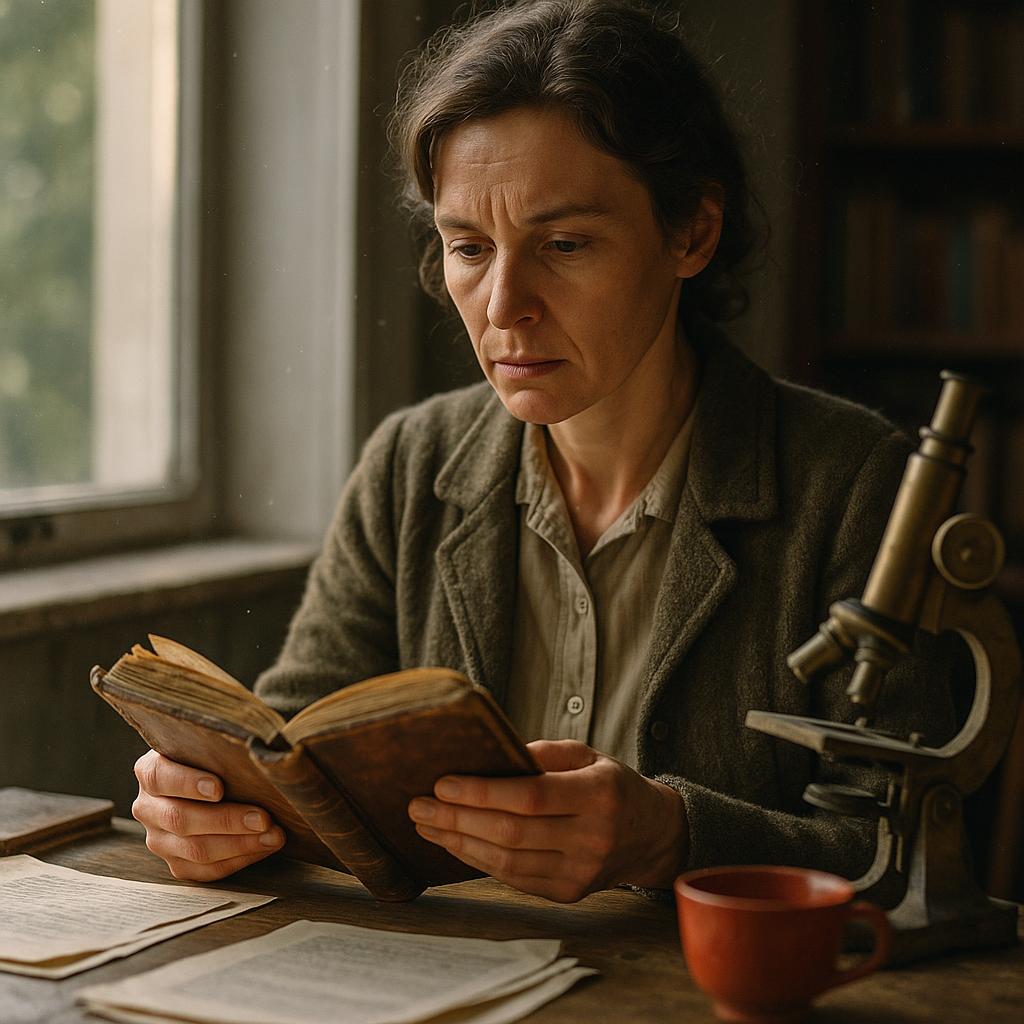 Image by RM AI
Image by RM AI
The Photograph
I was about to close Edith's journal when something slipped from between the pages—a faded photograph that made my heart stop. It showed a younger Edith, her posture confident and professional, standing outside what appeared to be a research facility in Switzerland. The building's sign read 'Institut für Fortgeschrittene Wissenschaften, 1962.' But it wasn't Edith that made my hands tremble. There, in the background, partially obscured by a delivery truck but unmistakable, was Thorne. The same silver hair. The same penetrating eyes. The same face—not younger, not different—exactly as he appears now, stalking me around Hawthorne Lane. I sank into my armchair, the photo trembling in my fingers. The math was impossible. This picture was taken over sixty years ago, yet Thorne hadn't aged a day. The realization hit me like a physical blow: Thorne wasn't just some collector or government agent hunting Edith's device. He existed outside normal time. Perhaps he had a device of his own, or perhaps the consequences of using these mechanisms went far beyond what Edith had documented. I turned the photo over and found Edith's neat handwriting: 'He follows the devices through time. He collects them—and their keepers.' A chill ran down my spine as I realized what I'd become in this cosmic game—not just a temporary guardian of an antique curiosity, but the newest piece in Thorne's collection.
 Image by RM AI
Image by RM AI
Home Invasion
I knew something was wrong the moment I turned onto Hawthorne Lane. Call it intuition or just the heightened paranoia that comes from carrying a time-altering device in your cardigan pocket, but something felt off. My suspicions were confirmed when I reached my front porch and saw my door slightly ajar—just an inch, but enough to send ice through my veins. I never leave my door unlocked, let alone open. I stood frozen, keys dangling uselessly in my hand. Should I call the police? And tell them what exactly? That I'm worried someone stole a mysterious device that erases people from existence? Instead, I pushed the door open with my foot and stepped inside. The destruction wasn't violent, but methodical—cushions overturned, drawers pulled out, books removed from shelves. Someone had been searching for something specific. My hand instinctively went to the special pouch I'd sewn into my cardigan, feeling the reassuring outline of Edith's device. Thank God I'd started carrying it with me. As I moved toward the kitchen, my foot crunched on broken glass—a picture frame containing a photo of me and Edith at last year's church picnic. The glass was shattered, but the photo remained intact. On my kitchen table sat a crisp white note, the handwriting elegant and flowing in a way people don't write anymore: 'It doesn't belong to you. It never did.' I stared at the note, my hands trembling. The handwriting wasn't Thorne's sharp, angular script. Someone else was after the device—someone who'd been inside my home, touching my things, invading my life. And the most terrifying part? Whoever wrote this note knew exactly what I had.
 Image by RM AI
Image by RM AI
The Second Hunter
The police officer couldn't have looked more bored if he tried. 'So nothing valuable was taken?' he asked for the third time, his pen hovering lazily over his notepad. I explained again about the methodical searching, the broken picture frame, the cryptic note. He nodded absently, clearly filing this under 'paranoid old lady' in his mental cabinet. That's when I noticed her—standing across the street, partially hidden by Mrs. Peterson's overgrown hydrangea bush. Elderly but regal, with a straight spine that defied her years and the most striking silver hair I'd ever seen, styled in an elegant bob that framed her face perfectly. Unlike Thorne's predatory stare, her gaze was steady, almost... familiar. When our eyes met, she didn't look away or pretend to be doing something else. Instead, she gave me a slight, deliberate nod—an acknowledgment that sent chills down my spine. The officer followed my gaze and frowned. 'Friend of yours?' he asked. By the time I looked back, she had vanished, leaving only the swaying hydrangeas as evidence she'd been there at all. I mumbled something about neighbors checking on the commotion, but my mind was racing. Her eyes had the same intensity as Thorne's, but there was something different there—not hunger, but recognition. And suddenly I understood with terrifying clarity: Thorne wasn't the only one hunting Edith's device. There were others. And this silver-haired woman had just announced herself as player number two in a game I never asked to join.
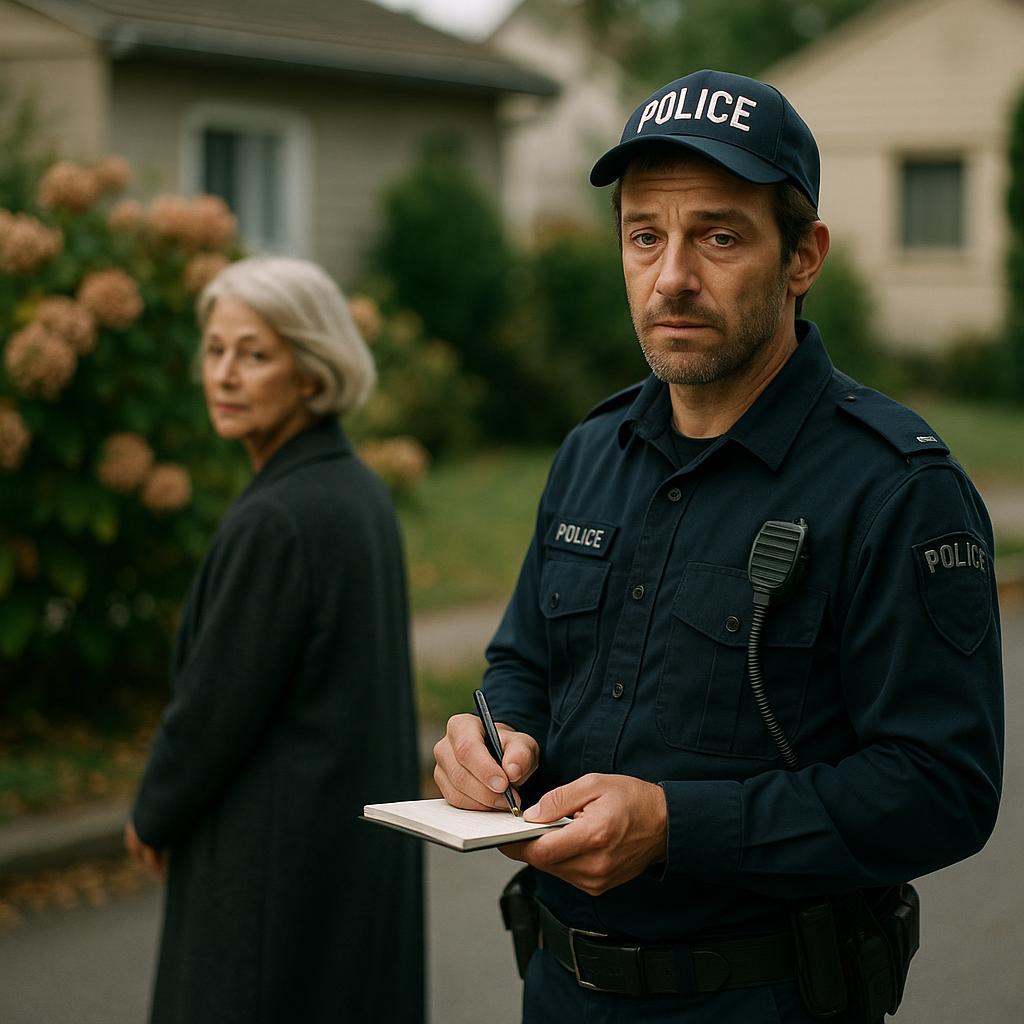 Image by RM AI
Image by RM AI
Patty's Revelation
I finally broke down and told Patty about the break-in over coffee at my kitchen table. I kept my voice steady, describing the methodical searching and the cryptic note, but carefully omitting any mention of Edith's device nestled in my cardigan pocket. Patty listened intently, her usual gossip-hungry expression replaced with something more serious. Then she did something that knocked the wind right out of me. 'Marjorie,' she said, leaning forward until I could smell her peppermint breath, 'I think this has something to do with Edith's... thing.' My coffee cup froze halfway to my lips. 'What thing?' I managed to ask. Patty glanced around as if someone might be eavesdropping in my empty house. 'About seven years ago, during that terrible thunderstorm that knocked out power for three days—remember?' I nodded, though I wasn't sure where this was going. 'Well, I was bringing Edith some candles, and through her window, I saw her fiddling with this strange brass object. There was this... glow.' Patty's voice dropped to a whisper. 'The next morning, everyone was talking about the storm damage, but... the power was on. Had been all night, they said. People looked at me like I was crazy when I mentioned the outage.' She shook her head. 'I convinced myself I'd dreamed it all. But I didn't, did I, Marjorie?' The look in her eyes told me she already knew the answer. All these years, Patty had been carrying a piece of Edith's secret—and now she was about to become entangled in mine.
 Image by RM AI
Image by RM AI
The Silver-Haired Woman's Approach
I nearly jumped out of my skin when the doorbell rang the next morning. Standing on my porch was the silver-haired woman I'd spotted across the street, elegant and poised as if she'd stepped out of another era. 'Mrs. Winters,' she said with a slight accent I couldn't quite place—maybe Eastern European? 'My name is Eleanor. I believe we have mutual interests to discuss.' Something in her eyes made me hesitate, but curiosity won out. I stepped aside to let her in, watching as her gaze methodically swept my living room, lingering on bookshelves and cabinets. She wasn't just looking—she was searching. 'Tea?' I offered, trying to sound casual while my hand instinctively pressed against my cardigan pocket where the device rested. 'That would be lovely,' she replied, settling onto my sofa with the grace of someone used to fine furniture. Then, with deliberate slowness, she reached into her handbag and placed an antique pocket watch on my coffee table. My breath caught. The intricate brass markings along its edge were unmistakably similar to those on Edith's device—the same swirling patterns, the same strange symbols I couldn't decipher. 'I believe,' Eleanor said, her voice dropping to just above a whisper, 'that you've recently come into possession of something that belongs to a very exclusive collection.' Her fingers hovered over the pocket watch, and I swear I could feel my own device warming in response, as if the two objects were somehow communicating across the space between us.
 Image by RM AI
Image by RM AI
Eleanor's Story
Eleanor's hands trembled slightly as she cradled her teacup. 'I was twenty-six when we found the first device,' she said, her voice steady despite the weight of her words. 'It was 1947, at a research facility outside of Boston. We were studying temporal anomalies—strange reports of time inconsistencies around certain artifacts.' She described a team of brilliant scientists, including a younger Thorne, who had been handsome and charismatic back then. 'The devices weren't created by us,' she explained, setting down her cup with precision. 'They've appeared throughout history—in ancient Egypt, medieval Europe, even in Leonardo da Vinci's workshop. We simply... found them.' According to Eleanor, the devices seemed to choose their keepers, attaching themselves to people who could sense the subtle shifts in time. 'Thorne was brilliant but reckless,' she continued, her eyes darkening. 'He became obsessed with controlling all the devices, convinced they could be used to manipulate reality itself.' She leaned forward, her silver hair catching the light. 'What he doesn't understand—what he refuses to understand—is that the devices aren't tools. They're more like... living things. And they have their own agenda.' The way she said it sent chills down my spine. I wanted to dismiss her story as the ramblings of a delusional old woman, but the device in my pocket seemed to pulse in response to her words, as if confirming every fantastic detail.
 Image by RM AI
Image by RM AI
The Keepers
Eleanor set her teacup down with a delicate precision that spoke of decades of careful movements. 'We call ourselves the Keepers,' she said, her voice taking on a reverent quality. 'We're scattered across the world, each bonded to a device like yours.' She explained how the devices weren't just objects but semi-sentient things that chose their caretakers. 'Edith was one of us once,' she continued, her eyes growing distant with memory. 'But she refused to follow our protocols. She believed her device had... special properties.' I felt the weight of Edith's device in my pocket, suddenly aware of its warmth against my hip. 'The devices form bonds with us,' Eleanor said, watching me closely. 'They change us, and we change them. It's a symbiotic relationship that grows stronger over time.' She leaned forward, her silver hair catching the light. 'That's why Thorne is so dangerous. He doesn't want to protect the devices—he wants to collect them, to harness their collective power.' Her fingers trembled slightly as she reached for my hand. 'Edith knew you were special, Marjorie. The device wouldn't have accepted you otherwise.' I pulled back, suddenly overwhelmed. 'I never asked for this,' I whispered. Eleanor's smile was sad but knowing. 'None of us did. But once chosen, you have only two paths forward—embrace your role as a Keeper, or spend the rest of your life running from those who would take it from you.'
 Image by RM AI
Image by RM AI
The Warning About Thorne
Eleanor's eyes darkened as she leaned closer. 'Thorne isn't just some collector, Marjorie. He's been hunting these devices for over a century.' My teacup froze halfway to my lips. 'A century?' She nodded grimly. 'He uses one to extend his own lifespan. That's why he looks the same in that 1962 photo.' The thought made my skin crawl. 'He wants them all, Marjorie. Every single device. With enough of them, he believes he can control time itself—rewrite reality according to his whims.' I set my cup down with a shaky hand. 'And why should I trust you over him?' I asked, my voice barely above a whisper. Eleanor's smile was sad but patient, like a teacher explaining something obvious. 'You don't have to trust me,' she said simply. 'Ask your device.' I blinked in confusion. 'Ask it?' She nodded toward my cardigan pocket. 'It can sense intentions—it knows friend from foe. That's why it's warm in my presence but probably burns cold when Thorne is near.' I thought back to the church parking lot, how the device had seemed to pulse with warning when Thorne approached. 'The devices choose their keepers carefully,' Eleanor continued. 'Edith chose you for a reason.' As if responding to its name, the device in my pocket hummed gently against my hip—not threatening, but almost... reassuring. And in that moment, I realized I'd already made my choice without knowing it.
 Image by RM AI
Image by RM AI
Testing Eleanor's Claim
After Eleanor left, I sat alone in my living room, staring at the device in my palm. Could it really sense intentions like she claimed? I took a deep breath and closed my eyes, picturing Eleanor's elegant silver bob, her steady gaze, the way she spoke of the Keepers with such reverence. To my astonishment, the device responded—the brass disc rotated slightly on its own, and a pleasant warmth spread through my fingers, like holding a cup of tea that's just the right temperature. My heart raced. Then, with a growing sense of dread, I forced myself to think about Thorne—his predatory stare, his ageless face in that 1962 photograph, his relentless pursuit across decades. Immediately, the device turned ice-cold in my hand. The gears seemed to lock up, as if refusing to function in his presence, even in my thoughts. I gasped and nearly dropped it. "Oh my God," I whispered to my empty living room. Eleanor hadn't been lying. This wasn't just some antique curiosity—it was responding to my thoughts, confirming her wild claims about its semi-sentient nature. If this part was true, what else might be? The implications made me dizzy. I'd spent my entire life on Hawthorne Lane, content with my quiet existence, my library shifts, my mystery novels. Now I was holding something that could apparently think, feel, and judge—something that had chosen me. But the question that truly terrified me wasn't what the device could do—it was what it might want from me.
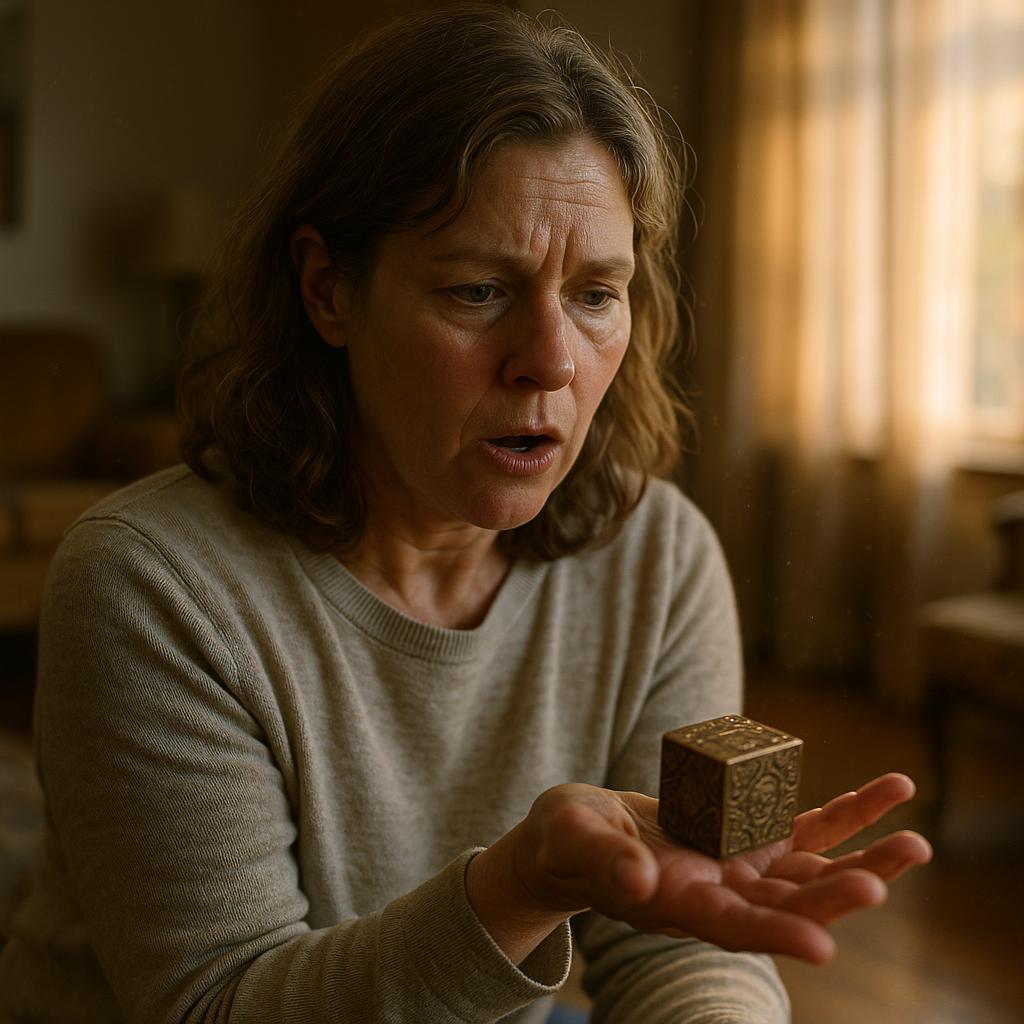 Image by RM AI
Image by RM AI
The Temporal Anomaly
I jolted awake at 2:17 AM, my heart hammering against my ribs. Something had pulled me from sleep—not a sound, but a presence. A soft, pulsing glow bathed my bedroom in an eerie blue light. Edith's device sat on my nightstand, its brass components gleaming as if alive, the tiny gears spinning of their own accord. I reached for it with trembling fingers, then froze as I glanced at my digital clock. The numbers were flickering wildly—2:17, 3:42, 1:05, back to 2:17, then suddenly 5:39. My stomach dropped. Through my bedroom window, I watched in horror as Mrs. Peterson walked her corgi down the sidewalk at impossible speed, then slowed to a crawl, as if someone were playing with time's remote control. Across the street, Mr. Gunderson collected his newspaper in reverse, the paper flying from his hands back to the lawn. I clutched the edge of my bed, dizzy with the realization that time itself was unraveling around me. The device grew warmer in my palm, its gears spinning faster as the temporal distortions intensified. This wasn't just some antique curiosity anymore—it was actively warping reality on Hawthorne Lane. Eleanor's words echoed in my mind: "The devices aren't tools. They're more like... living things." I needed to learn how to control it, and fast. Because if I couldn't, I had a sinking feeling that these minor fluctuations were just the beginning of something far more catastrophic.
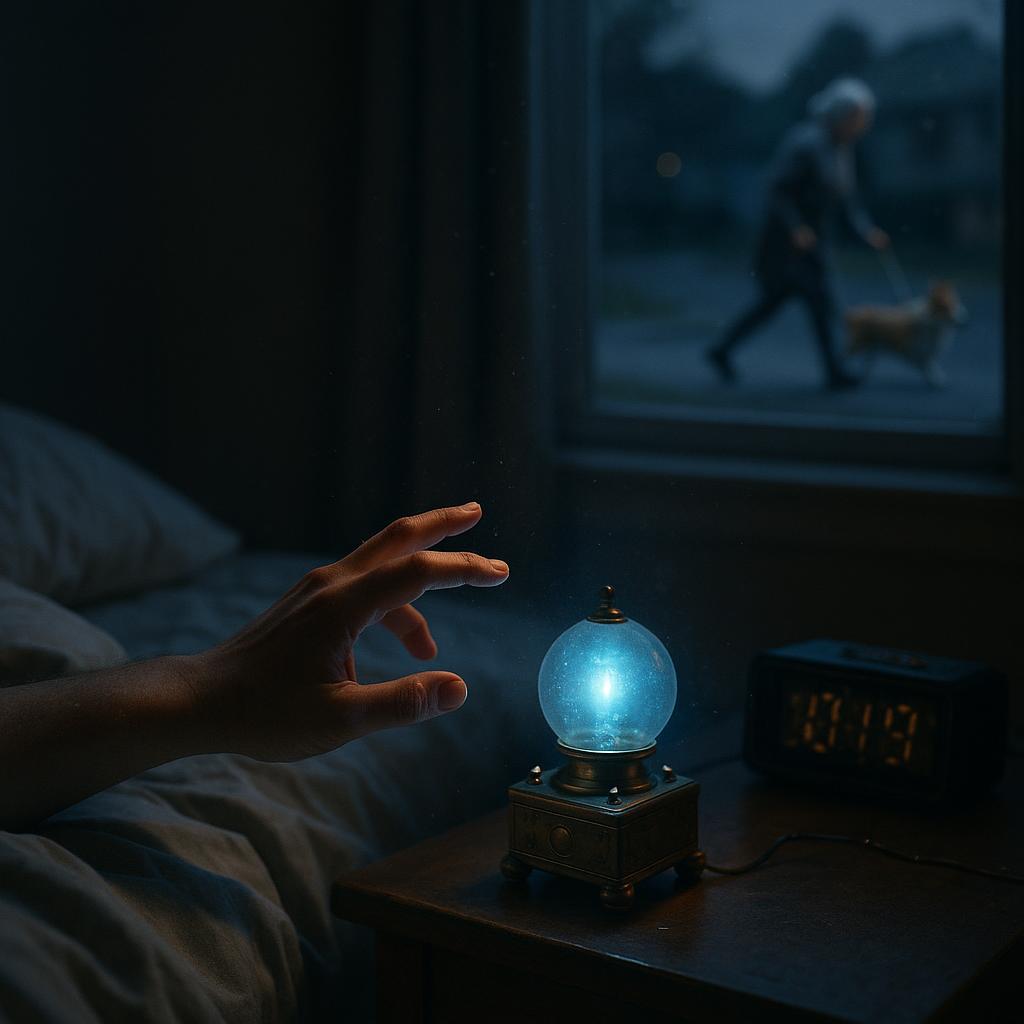 Image by RM AI
Image by RM AI
Eleanor's Training
Eleanor arrived at my house the next morning with a small leather case that looked like it belonged in a museum. "Today, we begin your training," she announced, settling at my kitchen table. For the next three hours, she taught me how to properly use Edith's device—something I'd been doing all wrong. "It's not about randomly turning dials," she explained, her elegant hands guiding mine. "The device responds to intention. You must visualize the specific change you desire while making the adjustment." I felt ridiculous at first, closing my eyes and picturing outcomes like I was in some new age meditation class. But when I focused on my wilting African violet—visualizing its drooping purple flowers standing tall again—and gently turned the disc, the plant literally transformed before my eyes. The browning petals regained their vibrant color, stems straightening as if someone had hit rewind on their decay. I gasped, nearly dropping the device. "Remarkable," Eleanor nodded approvingly. "But remember, Marjorie, larger changes require more energy and create greater ripples. Those ripples can attract unwanted attention." She tapped the brass casing. "Every adjustment has consequences. The timeline always seeks balance." The way she said it—with that grave expression—made me wonder what balance my little flower experiment might demand in return.
 Image by RM AI
Image by RM AI
The First Intentional Shift
I sat cross-legged on my living room floor that evening, Eleanor's instructions echoing in my mind. "Visualize her completely," she'd said. "Not just her face, but her essence." The device felt unusually warm as I closed my eyes and concentrated on Lila—her booming laugh that always started with a snort, her collection of hand-knitted scarves, the way she saved the crusts of her toast for birds. I turned the dial with deliberate slowness, feeling a strange electric current travel up my arm and through my chest. The brass mechanism hummed, almost singing, as the gears shifted into new positions. When I opened my eyes, the room seemed exactly the same, but something in the air felt... rearranged. The next morning at church, I nearly dropped my hymnal when Lila walked in, waving cheerfully as if she'd never been gone. "Saved you a seat!" she called, patting the pew beside her. Everyone greeted her normally—no one seemed to remember she'd been erased. But as the service progressed, I noticed discrepancies that made my skin prickle. The hymnal contained songs I'd never heard before, yet everyone around me sang confidently. Pastor Williams referenced a flood that had supposedly damaged the church basement last month—an event that had definitely never happened. I'd successfully brought Lila back, but something else had shifted in return. The universe had demanded its balance, just as Eleanor warned. What else had I unknowingly changed in my desperation to fix one mistake?
 Image by RM AI
Image by RM AI
Thorne's Confrontation
I was loading groceries into my trunk when I felt it—that familiar cold pulse from the device in my pocket, warning me seconds before I heard his voice. "Mrs. Winters." Thorne stood behind me, looking oddly normal in a beige windbreaker, like any other retiree picking up milk and bread. But his eyes gave him away—ancient and calculating. "I think we've danced around this long enough." I clutched my purse tighter, glancing around the parking lot. Not a soul nearby. Perfect. "I don't know what you're talking about," I said, trying to close my trunk, but he stepped forward, blocking it with his hand. "Eleanor's filled your head with fairy tales, hasn't she? The noble Keepers, protecting humanity?" His laugh was dry and humorless. "Did she mention how many people have died for her cause? Or what the devices really do to their hosts over time?" When I didn't respond, he grabbed my arm—not roughly, but with enough force that I couldn't pull away. His fingers were unnaturally warm against my skin. "You have no idea what you're dealing with," he whispered, his face inches from mine. "That thing isn't just changing your reality—it's feeding on it. On you." Something in his expression—a flicker of what looked almost like concern—made my certainty waver. "Eleanor isn't the savior she pretends to be. Ask her about Prague, 1968. Ask her what happened to the last person who had Edith's device." He released my arm and stepped back, straightening his jacket. "You have three days to make the right choice, Marjorie. After that, I can't guarantee anyone's safety—especially yours." As he walked away, the device in my pocket warmed again—but this time, the sensation felt different. Not a warning, but something else entirely. Something that made me wonder if it was responding to Thorne's words... or confirming them.
 Image by RM AI
Image by RM AI
Questioning Eleanor
I couldn't sleep that night, Thorne's words echoing in my head like a bad song on repeat. The next morning, I marched straight to Eleanor's temporary rental on Maple Street, the device cold and heavy in my pocket. 'What did Thorne mean about the device feeding on reality? On me?' I demanded the moment she opened the door. Eleanor's face fell, the composed mask slipping for just a second. She ushered me inside, checking the street before closing the door. 'I was going to tell you when you were ready,' she sighed, gesturing for me to sit. 'The devices require energy to function, Marjorie. Energy drawn from their keeper's timeline and memories.' My stomach dropped. 'So it's... what? Eating my memories?' Eleanor shook her head. 'Not exactly. It's more like it borrows from your reality to create changes. The longer you're bonded, the more efficient this process becomes.' She wouldn't meet my eyes. 'That's why keepers sometimes experience memory fluctuations or déjà vu. The device is integrating with your timeline.' I thought about the church hymns I suddenly couldn't remember, the flood that never happened until it did. 'And you didn't think this was important to mention?' I asked, my voice rising. Eleanor finally looked at me, her expression unreadable. 'There are things about being a Keeper that can't be explained, only experienced.' Something in her tone made me wonder what else she might be hiding. What had happened in Prague in 1968? And more importantly—what had happened to the person who had Edith's device before me?
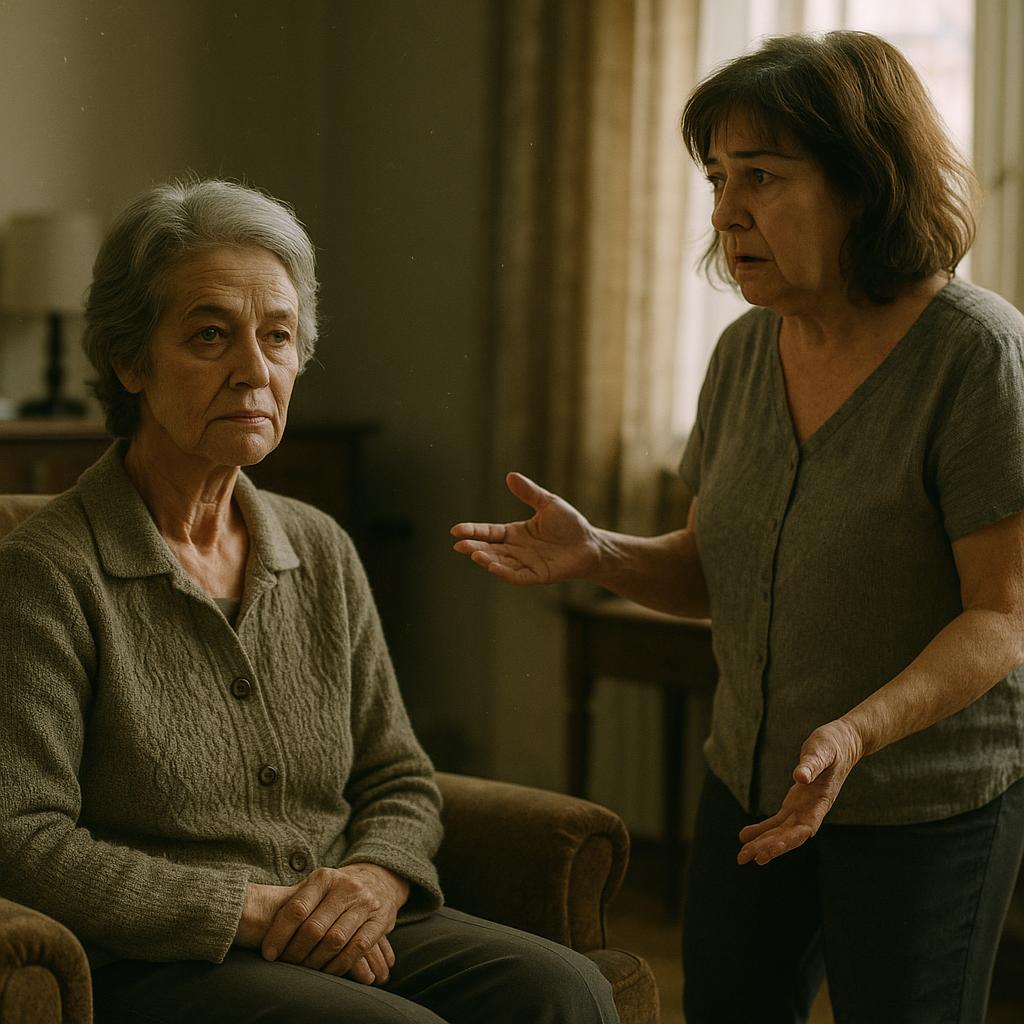 Image by RM AI
Image by RM AI
Memory Gaps
I was making my morning coffee when Patty called, chattering excitedly about the lunch we'd supposedly had yesterday. "Those crab cakes were to die for! And I still can't believe that waiter spilled water all over that poor woman's silk blouse," she laughed. I froze, coffee pot suspended mid-pour. What lunch? I had no memory of eating crab cakes with Patty—or doing anything with her yesterday. According to my mental calendar, I'd spent the afternoon organizing Edith's photo albums. "Marjorie? You still there?" Patty's voice snapped me back. "Of course," I mumbled, playing along while panic bloomed in my chest. This wasn't the first memory gap I'd experienced this week. Three days ago, Mrs. Henderson thanked me for watering her plants while she was away—a favor I had no recollection of doing. Yesterday, I found a library book on my nightstand that I didn't remember checking out, with my bookmark halfway through. Most disturbing was finding notes in my own handwriting describing conversations I couldn't recall having. The device sat on my kitchen counter, its brass components gleaming innocently in the morning light. Eleanor's warning echoed in my mind: "It borrows from your reality to create changes." I wasn't just manipulating time—I was losing pieces of myself in the process. How much more would disappear before there was nothing left of the original Marjorie Winters?
 Image by RM AI
Image by RM AI
Edith's Final Message
I returned to Edith's house one last time, drawn by a nagging feeling I'd missed something important. In her bedroom, I pulled out the journals I'd already sorted through, but this time, tucked behind the dresser, I found a slim leather-bound book I'd never seen before. Or had I? With all these timeline shifts, I couldn't be sure anymore. The pages were filled with Edith's familiar handwriting, but what I read sent chills down my spine. "Neither side can be trusted," she'd written. "The Keepers claim to protect humanity, while Thorne seeks control, but they're two sides of the same corrupted coin." My hands trembled as I turned the pages. Edith had discovered that both factions wanted the devices for power—Eleanor's noble cause was just as dangerous as Thorne's ambition. "I chose isolation," she continued. "Keeping the device dormant is the only way to maintain balance. Activity draws attention. Silence is safety." The final entry, dated just weeks before her death, hit me like a punch to the gut: "I've chosen Marjorie as my successor not because she should use the device, but because she's the only one I trust to keep it dormant. If you're reading this, Marjorie, remember: they will both try to convince you they're right. They're both wrong." I closed the journal, my mind reeling. Had Edith never intended for me to use the device at all? And if that was true, what damage had I already done by ignoring her most important instruction?
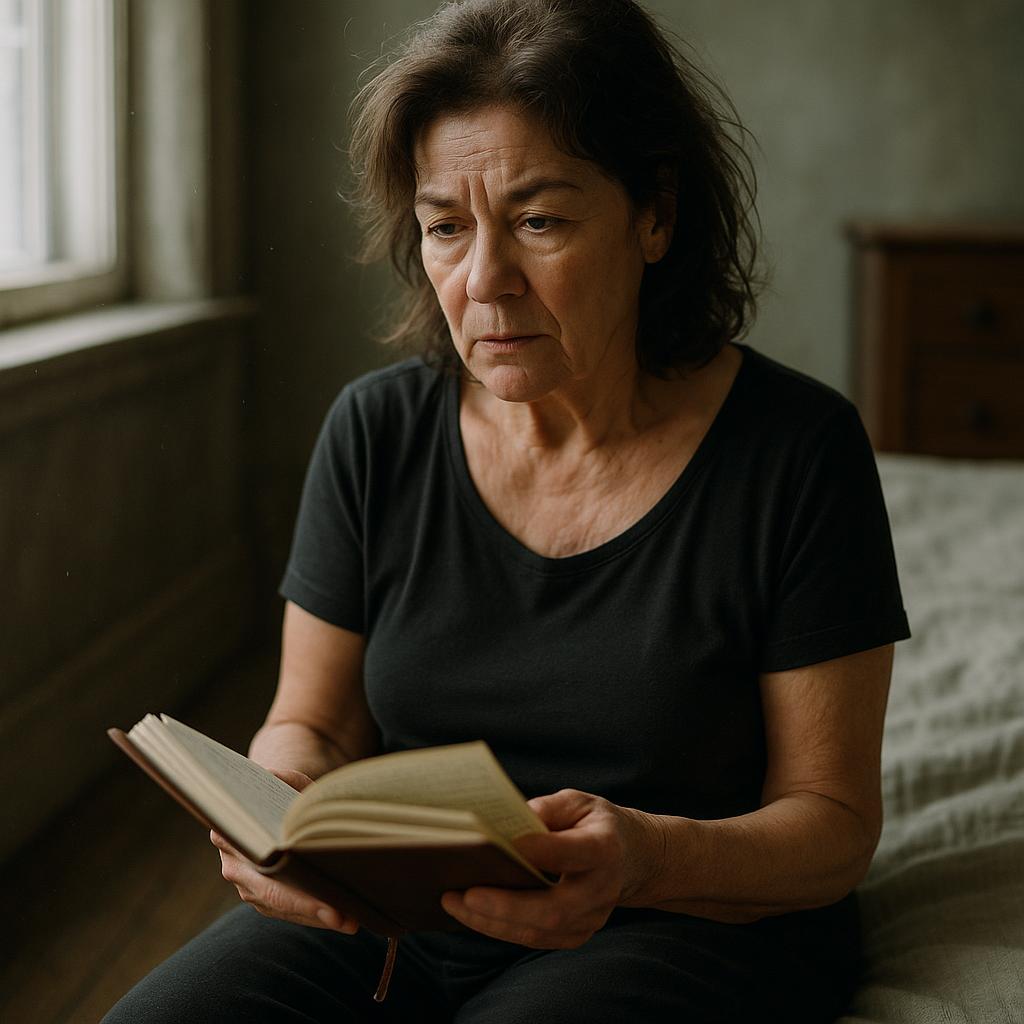 Image by RM AI
Image by RM AI
The True Purpose
I was dusting Edith's device when a frantic knocking startled me. Eleanor stood on my porch, her silver hair disheveled, eyes wild with urgency. "We need to synchronize our devices immediately," she insisted, pushing past me into the living room. "Thorne is planning something catastrophic that will affect all timelines." I hesitated, Edith's journal entries flashing through my mind. "Before we do anything," I said, clutching the device protectively, "I found Edith's private journal. She didn't trust either of you." Eleanor's composed facade cracked. She sank onto my couch, suddenly looking every bit her age. "Of course she didn't," she whispered. "Edith discovered the truth before any of us." What followed was a revelation that made my knees weak. The devices weren't random artifacts discovered throughout history—they were created by an ancient civilization as a system of checks and balances. "They built a network," Eleanor explained, her voice dropping to a reverent hush, "designed specifically to prevent anyone from altering time too dramatically." She reached for my device, her fingers trembling. "These aren't weapons or tools, Marjorie. They're safeguards. And when used together properly, they don't change time—they heal it." I stared at the brass mechanism in my palm, suddenly understanding why it had chosen me after Edith. It wasn't looking for someone who would use it. It was searching for someone who would protect it.
 Image by RM AI
Image by RM AI
The Synchronization Attempt
I stared at Eleanor's outstretched hand, Edith's warnings echoing in my mind. But what choice did I have? With trembling fingers, I placed my device next to hers on my coffee table. The effect was immediate—both brass mechanisms began to glow with an otherworldly light, their discs rotating in perfect opposition like some cosmic yin and yang. "It's working," Eleanor whispered, her face bathed in the golden glow. A strange humming filled the room, starting as a gentle vibration but quickly building to something that made my teeth ache. I felt a peculiar pulling sensation in my chest, as if something essential was being drawn out of me. "Eleanor," I gasped, "what's happening to us?" She didn't answer, her eyes fixed on the devices with an almost religious fervor. The air between us seemed to thicken, time itself bending around the synchronized mechanisms. That's when every window in my living room exploded inward in a shower of glass. I threw my arms up to shield my face, feeling tiny shards slice into my skin. Through the curtain of falling glass, I saw him—Thorne, standing on my front lawn. But he wasn't alone. Behind him stood five others, each holding what looked like smaller versions of our devices. "Stop the synchronization now!" he shouted, his voice carrying an authority that made the devices pulse brighter. "You have no idea what you're about to unleash!" The look on Eleanor's face told me everything I needed to know—whatever was happening wasn't going according to her plan at all.
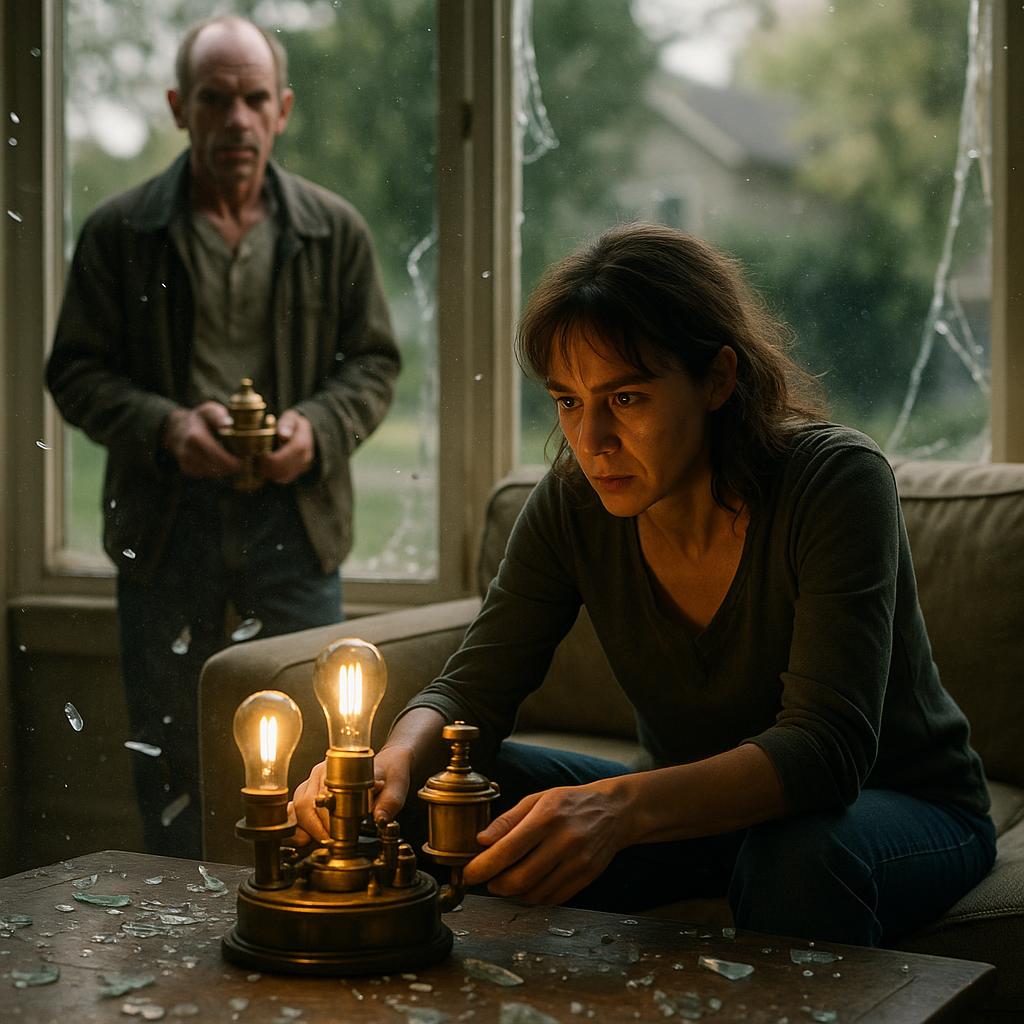 Image by RM AI
Image by RM AI
Thorne's Revelation
The living room erupted into chaos as Thorne burst through my front door, glass still raining down from the shattered windows. Behind him was a younger man—a carbon copy of Thorne himself, right down to those unsettling eyes that seemed to hold centuries within them. "This is my son," Thorne announced, though the word 'son' seemed absurd given what Eleanor had told me about Thorne's true age. The younger man nodded grimly at me, his hand hovering protectively near a device similar to mine. "She's lying to you, Marjorie," Thorne said, pointing accusingly at Eleanor. "She's not synchronizing your device with hers—she's overriding it completely. If she succeeds, your entire timeline will be erased. You, this house, everyone you've ever known—gone." Eleanor's face contorted with rage, but before she could respond, both devices on my coffee table began spinning wildly, emitting pulses of golden light that shot across the room like laser beams. With each pulse, time itself seemed to stutter—Mrs. Peterson walking her dog outside my window froze mid-stride, then suddenly jerked forward, then froze again. The grandfather clock in my hallway ticked backward, then forward, its hands spinning like propellers. I felt my own movements becoming disjointed, as if I were in a film where someone kept hitting pause and play. "Stop this!" I screamed, but my voice came out in broken fragments, echoing strangely in the strobe-like effect of frozen and unfrozen moments. Through it all, I couldn't help but wonder—if Thorne was telling the truth, what else had Eleanor been hiding from me?
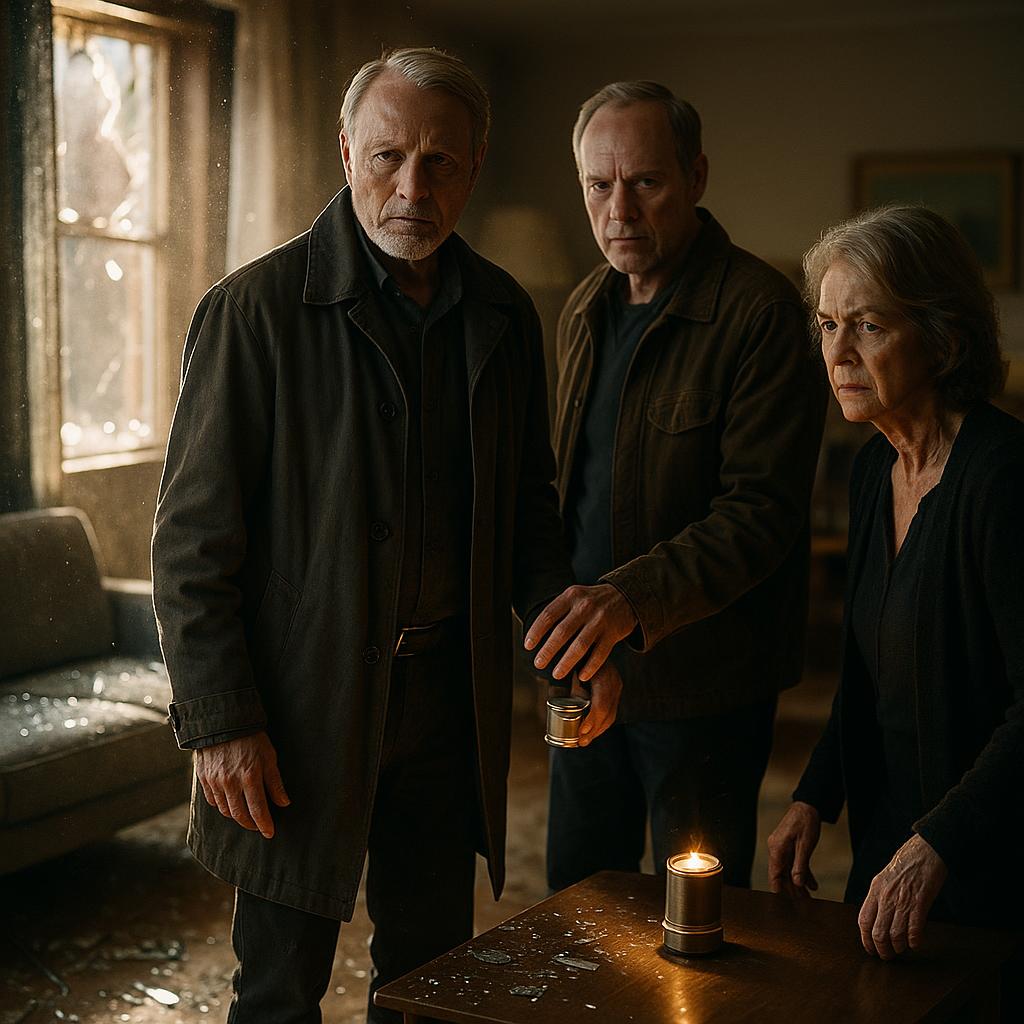 Image by RM AI
Image by RM AI
The Truth About the Keepers
As Eleanor and Thorne faced off in my living room, time itself seemed to stutter around us. 'Tell her the truth, Eleanor,' Thorne demanded, his voice eerily calm despite the chaos. Eleanor's composure finally cracked. 'Fine,' she spat. 'The Keepers don't just monitor these devices—we use them to maintain order.' She looked at me with pleading eyes. 'We've prevented wars, Marjorie. Stopped pandemics. Guided humanity away from self-destruction.' Thorne laughed bitterly. 'By playing god! By deciding which versions of history get to exist!' What struck me most was how they anticipated each other's arguments—finishing sentences, countering points before they were fully expressed. It was like watching two chess masters who had played the same game a thousand times. 'How many times have you two had this exact fight?' I asked, suddenly understanding. They both fell silent, exchanging a look I couldn't quite interpret. 'In how many timelines?' Eleanor sighed, suddenly looking ancient. 'We've been locked in this battle across countless realities, Marjorie. But this time is different.' Thorne nodded grimly. 'Because this time, you have Edith's device—the master key.' The realization hit me like a truck: I wasn't just caught between two opposing factions. I was the tiebreaker in a cosmic war that had been raging across the fabric of time itself.
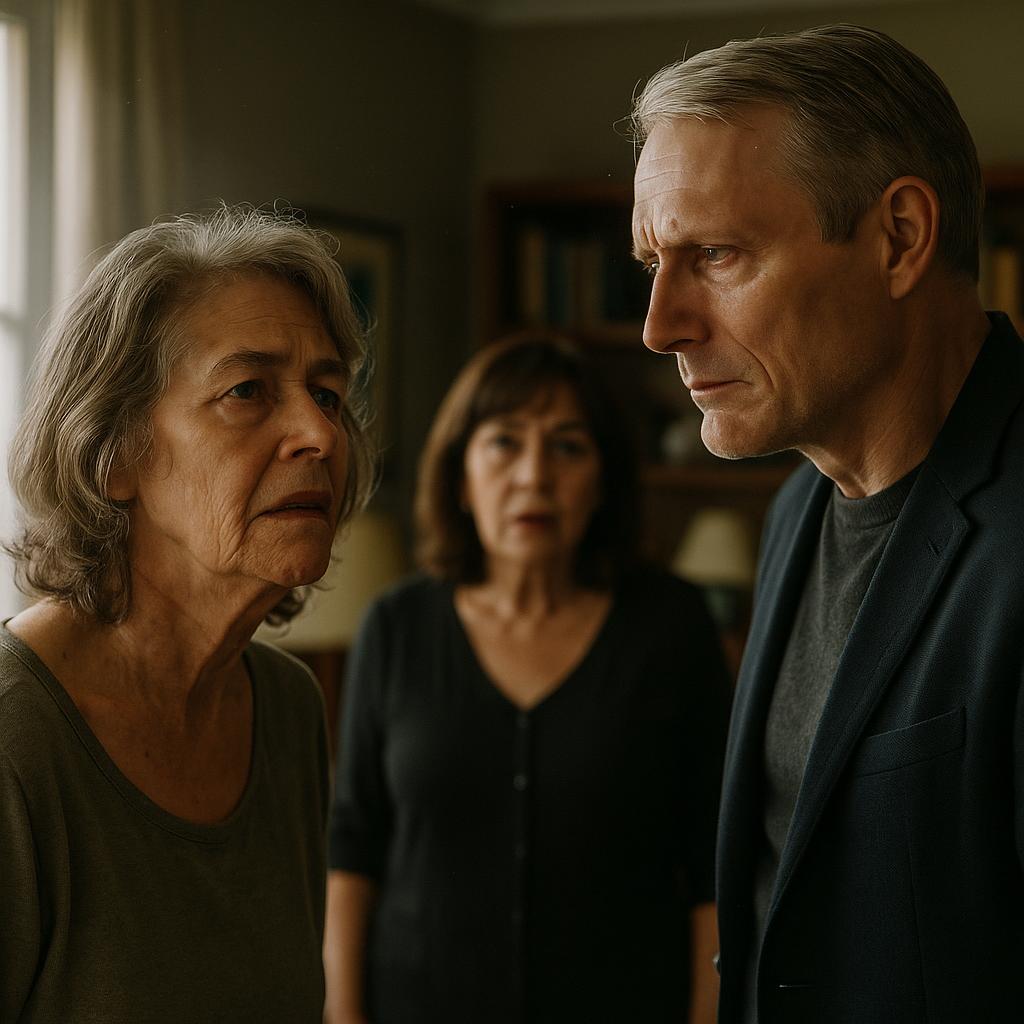 Image by RM AI
Image by RM AI
Edith's True Role
The silence in my living room was deafening as Thorne's revelation hung in the air. 'Edith wasn't just some rogue keeper who went off the grid,' he said, his voice softening with what sounded almost like respect. 'She was the architect of our potential salvation.' He explained that Edith had discovered the devices were never meant for continuous use—they were emergency measures, like defibrillators for reality when time went critically wrong. 'These things,' he gestured to my device, still pulsing with golden light, 'were designed to correct major anomalies and then go dormant.' According to Thorne, Edith had spent decades in secret, developing a method to neutralize all devices simultaneously. She'd created a reset protocol that would end their influence on reality permanently. 'That's why both sides were watching her,' Eleanor admitted reluctantly. 'We knew she was working on something revolutionary.' I thought about Edith's meticulously labeled boxes, her private journals, her quiet life that had concealed such profound purpose. Had she chosen me because I reminded her of herself? Someone who observed more than participated, who understood the value of letting things be? 'The box you found,' Thorne continued, 'contains more than just the device. It has the complete blueprint for Edith's neutralization method.' His eyes met mine with unexpected gentleness. 'She trusted you to finish what she started, Marjorie. Not to use the device, but to end its power forever.' What Thorne said next made my blood run cold—according to Edith's research, we had less than 48 hours before the temporal damage became irreversible.
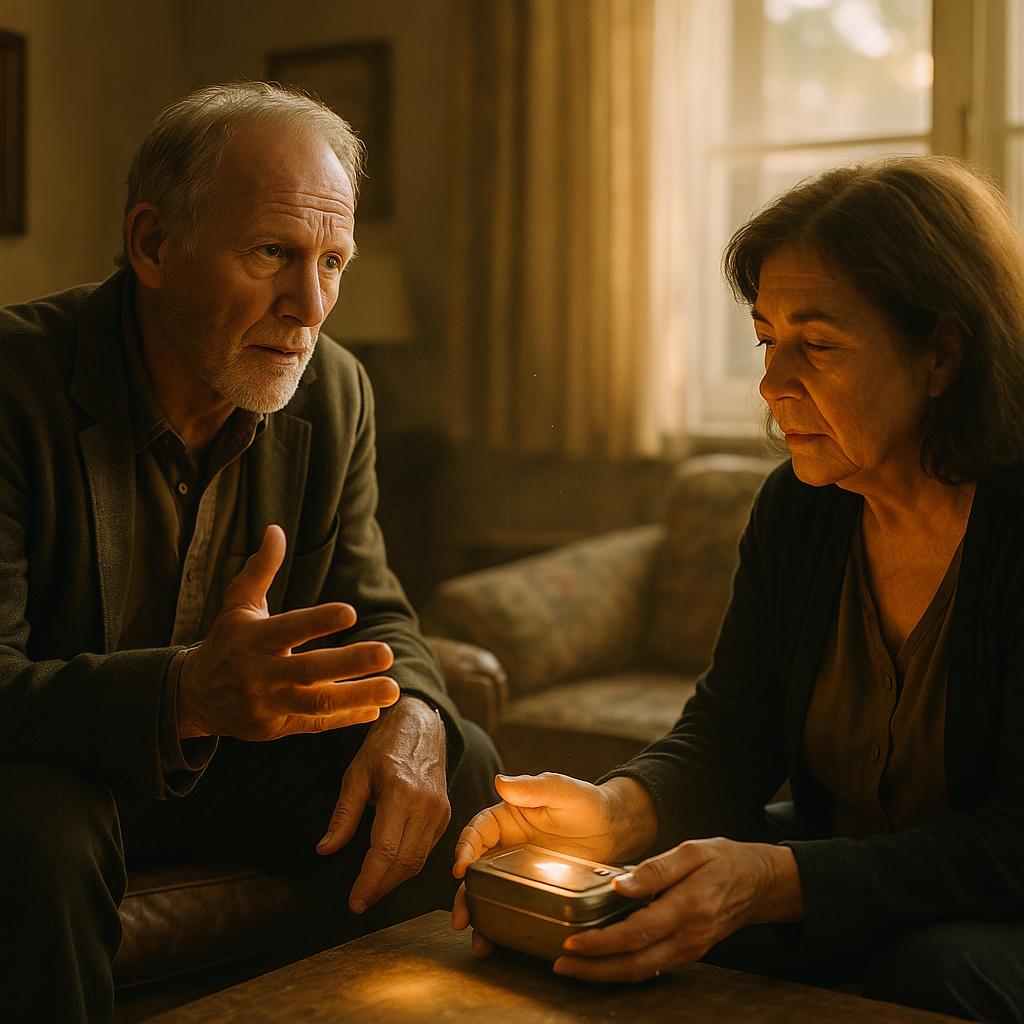 Image by RM AI
Image by RM AI
The Hidden Protocol
Eleanor lunged for my device with a desperation I'd never seen in her composed demeanor. The moment her fingers touched the brass surface, a blinding flash erupted and she yanked her hand back with a pained cry, angry red blisters already forming on her palm. "It rejected her," Thorne's son said, his voice filled with wonder. "Just like Edith predicted." In the chaos that followed—Eleanor cursing, Thorne restraining her—the younger man approached me cautiously. "Mrs. Winters, Edith wasn't just hiding from us," he explained, his eyes eerily like his father's but somehow kinder. "She was developing a reset protocol—a sequence that, when activated correctly, would cascade through all connected devices and return them to their dormant state." He gestured to my device, which now pulsed with a steady, almost heartbeat-like rhythm. "That's why she chose you specifically as her emergency contact. Something about you—your nature, your perspective—made her believe you would make the right choice when the moment came." I looked down at the device that had upended my quiet life on Hawthorne Lane. All this time, I thought Edith had burdened me with an impossible responsibility, but maybe she'd actually entrusted me with the solution. "So how do I activate this protocol?" I asked, my voice steadier than I felt. Thorne's son exchanged a look with his father before answering, "That's the problem. Edith never wrote it down. We believe she encoded it directly into the device itself—a sequence only the right keeper would instinctively know how to unlock."
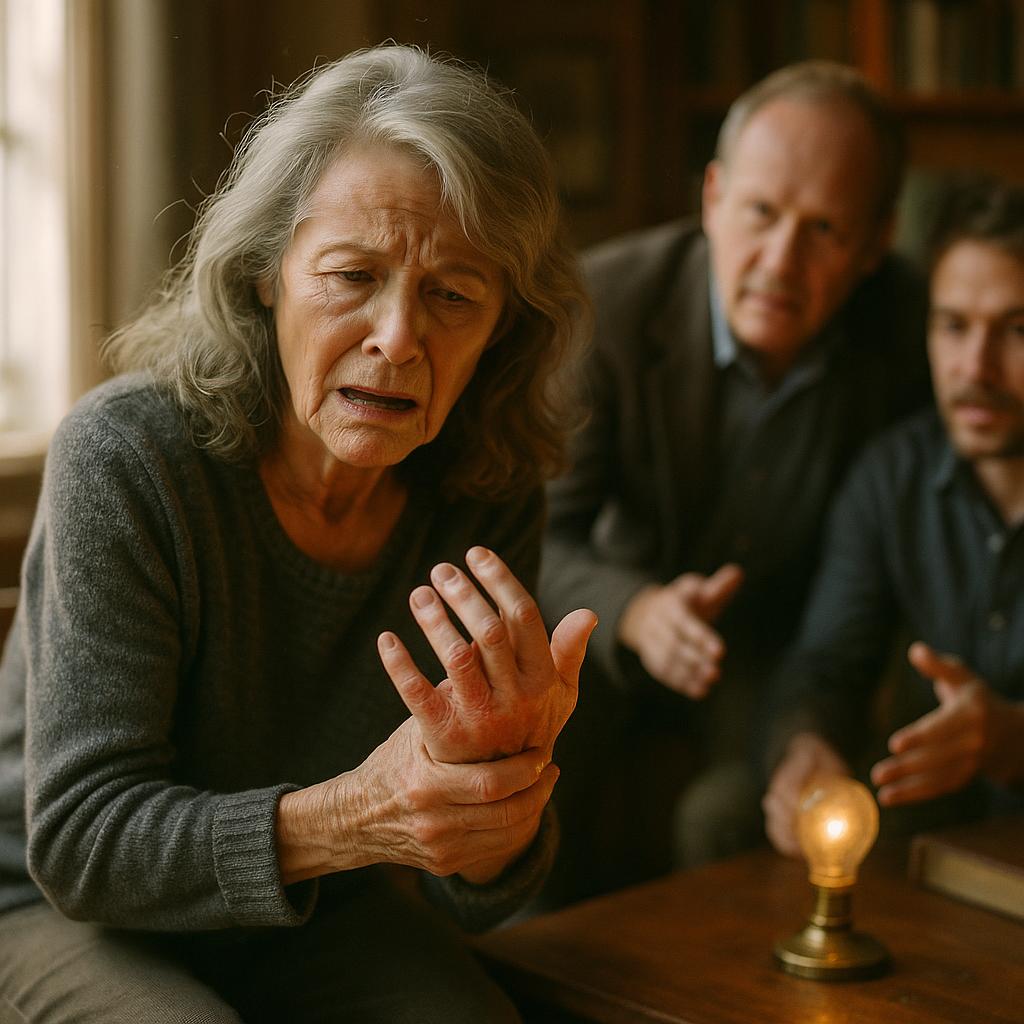 Image by RM AI
Image by RM AI
Reality Fractures
I clutched the edge of my coffee table as the world around me began to unravel. Through my living room windows, I could see multiple versions of Hawthorne Lane superimposed on each other like poorly aligned transparencies. The Peterson house across the street was blue, then yellow, then gone completely, replaced by a community garden I'd never seen before. "What's happening?" I gasped, watching Mrs. Henderson walk past my house three times simultaneously—once with her usual gray bob, once with flaming red hair, and once as a much younger woman pushing a stroller. Eleanor and Thorne both looked alarmed, their usual confidence shattered. "The devices are reacting to our conflict," Thorne explained, his voice tight with urgency. "They're creating a fracture point—multiple timelines bleeding into each other." I watched in horror as my neighbor Tom appeared on his porch, flickering between his current self and a version where he walked with a cane, then suddenly a version where a completely different family occupied his house. The sky outside cycled through different weather patterns—sunny, then stormy, then an eerie green I'd never seen before. "We don't have much time," Eleanor whispered, her eyes wide with fear. "If these realities fully collapse into each other, the damage will be catastrophic." As if to emphasize her point, a car drove down the street, phasing in and out of existence, its color changing from red to blue to silver with each flicker. I realized with growing dread that I wasn't just responsible for Edith's device anymore—I was now at the center of what might be the complete unraveling of reality itself.
 Image by RM AI
Image by RM AI
Patty's Intervention
A flash of light outside caught my attention, and through the chaos of multiple realities bleeding together, I saw Patty marching up my walkway. But unlike everything else on Hawthorne Lane, she wasn't flickering or phasing between different versions of herself. She walked straight through the temporal distortions like they were nothing but a light fog. "Patty, don't come in!" I shouted, but she ignored me, pushing past Thorne's son to enter my living room. "Oh, for heaven's sake," she huffed, surveying the scene with hands on her hips. "I knew it would come to this." Eleanor and Thorne both froze, staring at her in disbelief. "Patricia Wilkins," Eleanor whispered. "You're supposed to be dead." Patty rolled her eyes. "And you're supposed to be protecting humanity, not trying to control it." She turned to me, her familiar face suddenly serious in a way I'd never seen before. "Marjorie, I've known about these devices for forty-three years. I wasn't just Edith's neighbor—I was her partner." My jaw dropped as she reached for my device with steady hands. "Why do you think I befriended you so quickly when you moved in? Edith and I spent decades developing the reset protocol. She chose you as her successor, but I was her insurance policy." The device glowed brighter at her touch, and for the first time since this nightmare began, I felt something I'd almost forgotten—hope. What I couldn't understand was why Patty, my bridge-playing, gossip-loving friend who made the best lemon squares on Hawthorne Lane, had kept this secret from me all along.
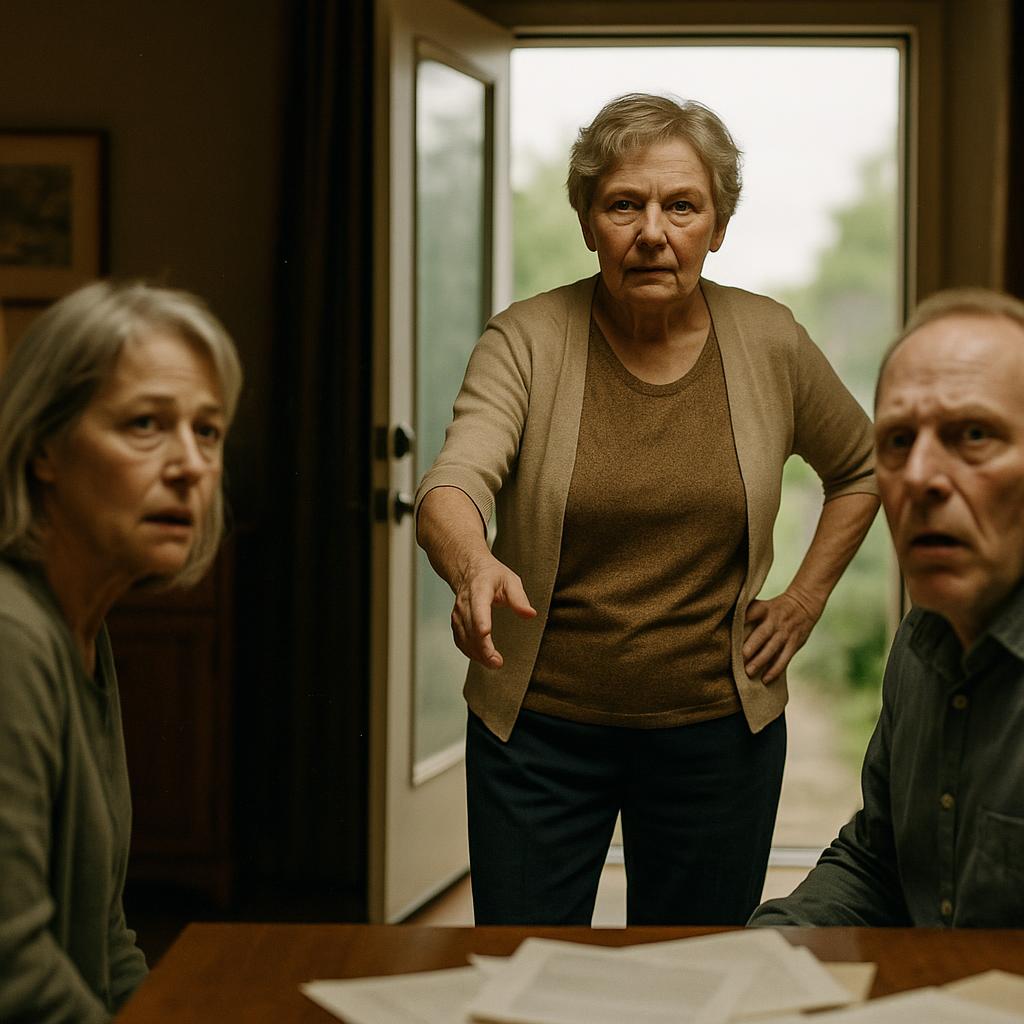 Image by RM AI
Image by RM AI
The Activation Sequence
"The reset protocol requires someone who doesn't want power," Patty explained, her voice steady despite the chaos swirling around us. "That's why Edith chose you, Marjorie. You never wanted to control time—you just want your quiet life back." She guided my trembling hands to the device, positioning my fingers on specific points of the brass surface. "We need to turn the disc in a very precise pattern while I recite the activation words." Before we could begin, Eleanor lunged forward, her face contorted with desperation. "You don't understand what you're doing!" she screamed. Thorne moved simultaneously from the other side, his eyes wild. "Stop them!" he commanded his followers. But Patty was faster than she looked. She quickly turned the device's disc clockwise, then counter-clockwise, then clockwise again in a rhythm that somehow felt familiar to my fingers. As she did, she began chanting words in a language I'd never heard before—yet somehow, the meaning resonated deep within me. Protection. Balance. Release. Home. The device grew warm under our touch, pulsing with golden light that seemed to push Eleanor and Thorne back whenever they tried to approach. "Keep focusing on what you want, Marjorie," Patty instructed between phrases. "Picture Hawthorne Lane as it should be. Picture your normal life." I closed my eyes and thought of my porch swing, my garden, my quiet evenings with a book. As I did, the device began to hum with increasing intensity, and I felt something shifting—not just around us, but within the very fabric of reality itself.
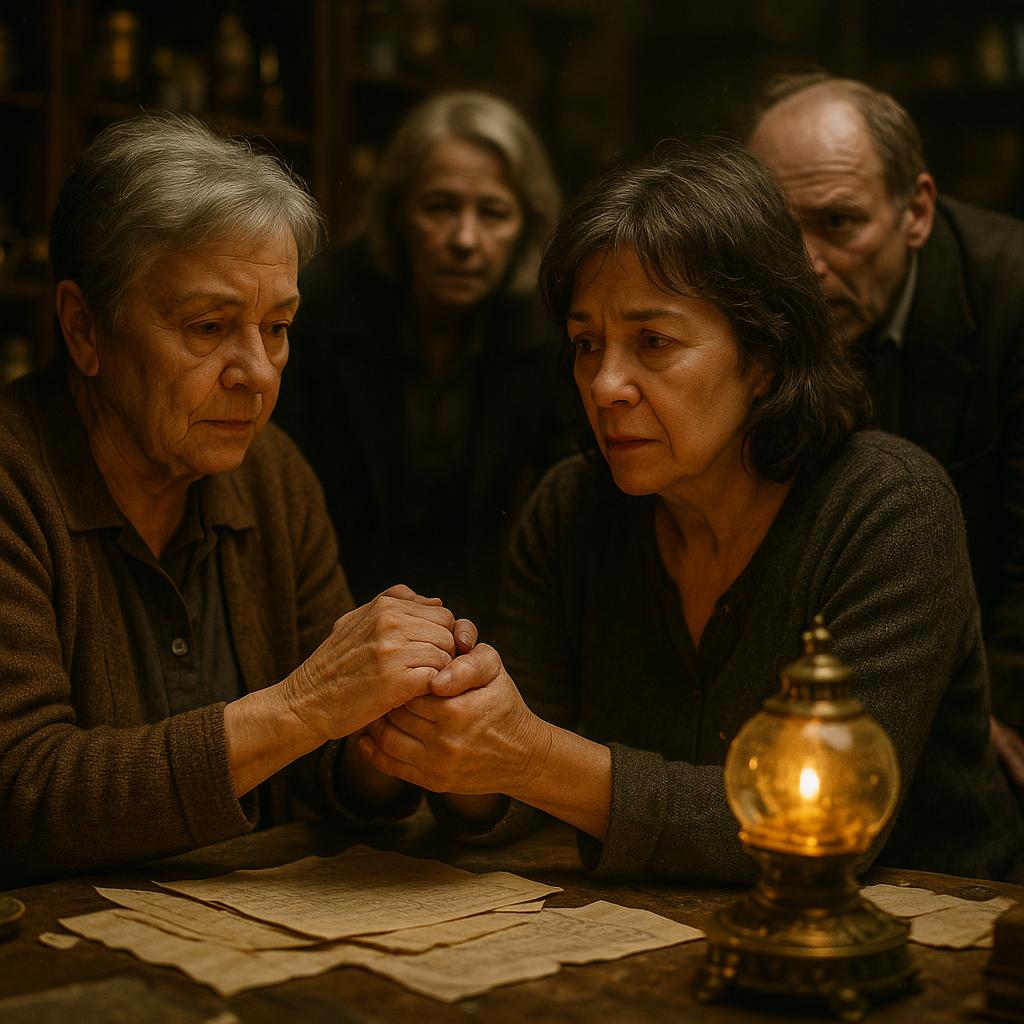 Image by RM AI
Image by RM AI
The Reset Begins
The moment Patty completed the activation sequence, my device erupted with a light so intense I had to shield my eyes. It was like holding a miniature sun in my palm, pulsing with golden waves that rippled outward through my living room. Eleanor gasped as her device responded immediately, its brass disc spinning wildly, matching the rhythm of mine as if they were long-lost twins finally reunited. "It's working," Patty whispered, her voice filled with awe. Thorne's son stepped forward, his face a mixture of fear and resignation as he pulled out a smaller device from his coat pocket. "I never wanted this power," he confessed, placing his device on the table. It immediately began to hum and glow, joining the others in what looked like some cosmic dance. Through my windows, I could see the fractured versions of Hawthorne Lane beginning to merge—the multiple Mrs. Hendersons fading into just one, Tom's house settling back into its familiar blue siding. Eleanor lunged forward, her face contorted in rage. "Do you have ANY idea what you're destroying?" she screamed. "Centuries of careful management! Without us, humanity will destroy itself!" Thorne wasn't any calmer, his ancient eyes wild with panic. "Stop this immediately!" he commanded, but his voice held no power now. The devices had made their choice. As reality consolidated around us, I felt a strange peace washing over me. This was what Edith had worked toward her entire life—not control, but release. Freedom from manipulation. But as the golden light grew brighter, I noticed something alarming: Patty's hand was beginning to fade, becoming transparent like a ghost.
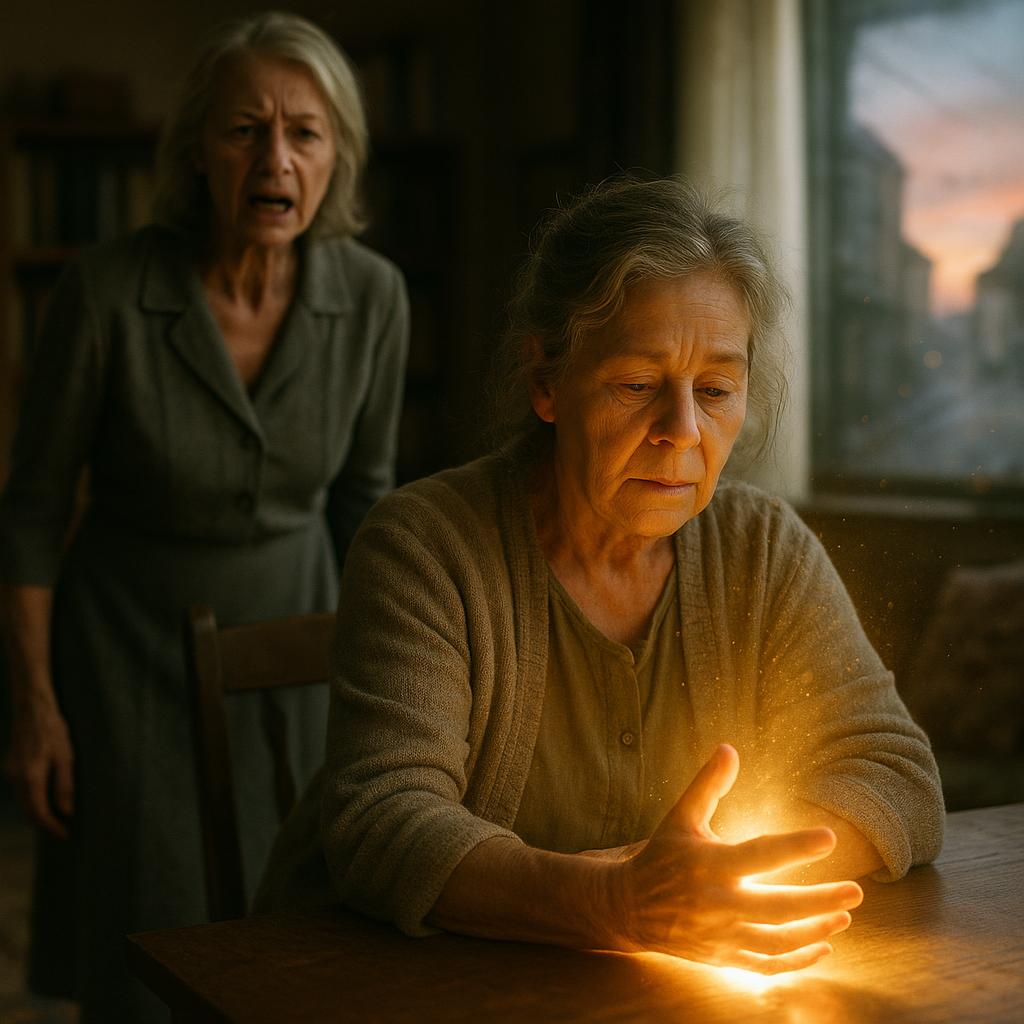 Image by RM AI
Image by RM AI
The Final Confrontation
I never imagined my quiet life on Hawthorne Lane would culminate in what felt like the final scene of a sci-fi movie. Thorne lunged at Patty with unexpected speed, his ancient eyes wild with desperation. Simultaneously, Eleanor grabbed my wrists, her manicured nails digging into my skin as she tried to pry the device from my hands. "You'll doom us all!" she shrieked. I held on for dear life, feeling the warm brass against my palm like it had become part of me. The most shocking moment came when Thorne's son—this man who had followed his father across countless timelines—suddenly tackled him to the ground. "Finish it, Marjorie!" he shouted, struggling to restrain his father. "This has gone on long enough!" My living room transformed into something out of a nightmare. The antique vase my mother had given me floated upward, suspended in mid-air. My coffee table lifted six inches off the floor. The walls themselves seemed to breathe, expanding and contracting as if the house was alive. Through my window, I could see Hawthorne Lane bending like a reflection in a funhouse mirror. "Patty!" I called out, my voice sounding distorted even to my own ears. She nodded at me, her partially transparent hand still guiding mine on the device. "Turn it once more," she instructed calmly, despite the chaos. "Clockwise, then press the center." As I followed her instructions, the device grew hot—almost unbearably so—and I realized with absolute certainty that whatever happened next would determine not just my fate, but the fate of time itself.
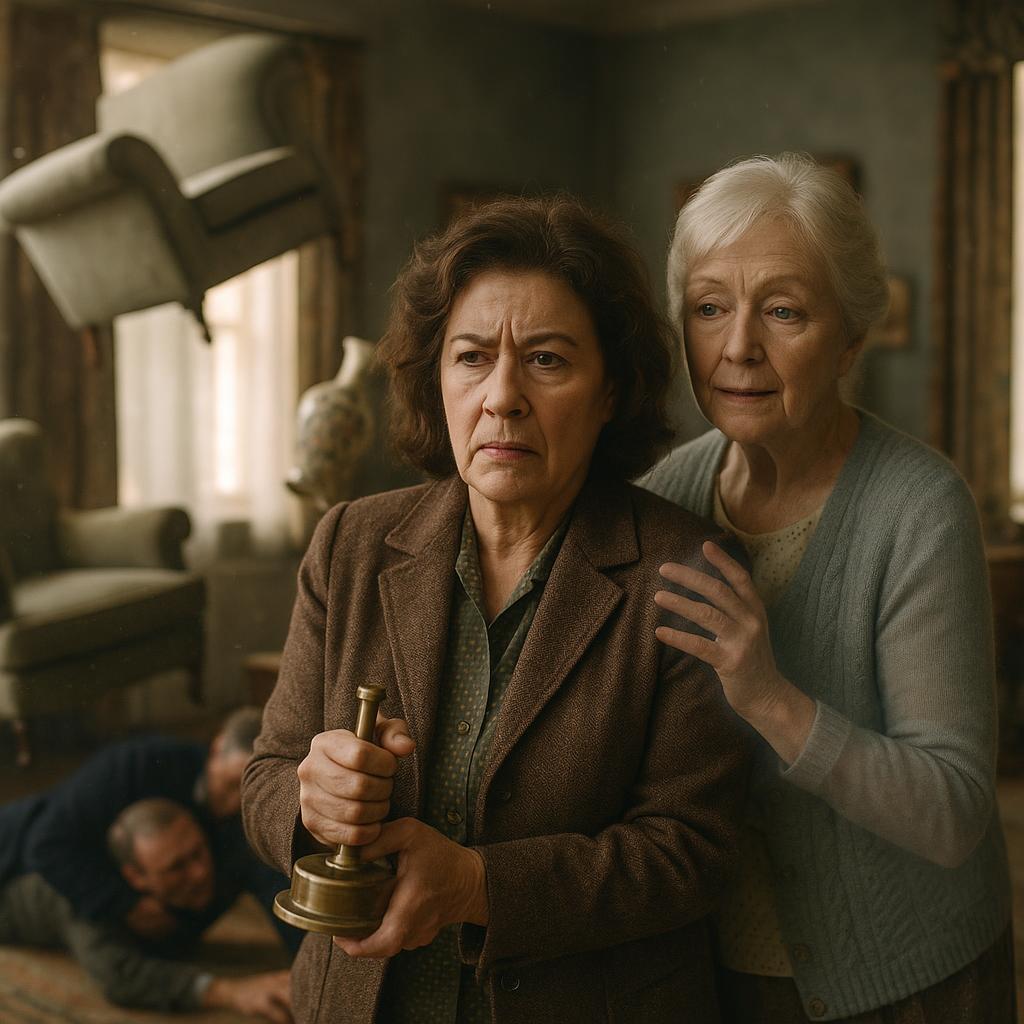 Image by RM AI
Image by RM AI
Edith's Legacy
As the golden light enveloped the room, something extraordinary happened. The chaos around me faded, and suddenly I was somewhere else—or rather, somewhen else. Before me stood Edith, not as the 82-year-old neighbor I'd known, but as a vibrant woman in her thirties, her eyes bright with purpose. "You see me now as I was when I first found it," she said, her voice clearer than I'd ever heard it. "I chose you, Marjorie, because you understand what matters. Not power or control, but consistency. Community. The simple joy of knowing your neighbors." She smiled, and I recognized that smile from decades of polite nods across our fences. "The device tempts people with the power to reshape reality, but you—you just want your porch swing back." She laughed softly. "That's why it couldn't corrupt you." Then came the revelation that knocked the wind from me. "Patty isn't just my friend," Edith continued. "She's my sister. We've worked together for fifty years, preparing for this moment when someone like you could heal all timelines." I watched as younger versions of Edith and Patty huddled over journals, crafting the very protocol we were now completing. "We hid in plain sight," Edith explained, "two old ladies no one would suspect of trying to save reality itself." As her image began to fade, she reached out as if to touch my cheek. "You're finishing what we started, Marjorie. But I should warn you—when time heals, memories sometimes... shift."
 Image by RM AI
Image by RM AI
The White Flash
The three devices suddenly synchronized, their golden glow intensifying until they erupted into a blinding white light that swallowed everything in my living room. I gasped as the sensation of solid ground beneath my feet disappeared, replaced by the terrifying feeling of free-falling through what I can only describe as the fabric of time itself. Fragments of different lives—my lives—flashed before me like scenes from a movie playing at impossible speed. In one, I never moved to Hawthorne Lane at all. In another, Edith and I shared weekly tea for decades, our friendship deep and meaningful. The most jarring vision showed me as a Keeper myself, wielding a device with the same cold calculation as Eleanor. Through the chaos, I glimpsed Eleanor and Thorne, their bodies seeming to age rapidly as the light touched them—decades, centuries catching up in seconds as they dissolved like sugar in hot tea. Their screams echoed strangely, distorted as if coming from every direction at once. Patty remained the longest, her form growing increasingly transparent but her smile unwavering. Tears streamed down her face as she mouthed 'thank you' to me, her eyes filled with a peace I hadn't seen since this nightmare began. As the white light consumed everything, one final thought struck me: I never asked Edith or Patty what would happen to them—to us—when time finally healed itself.
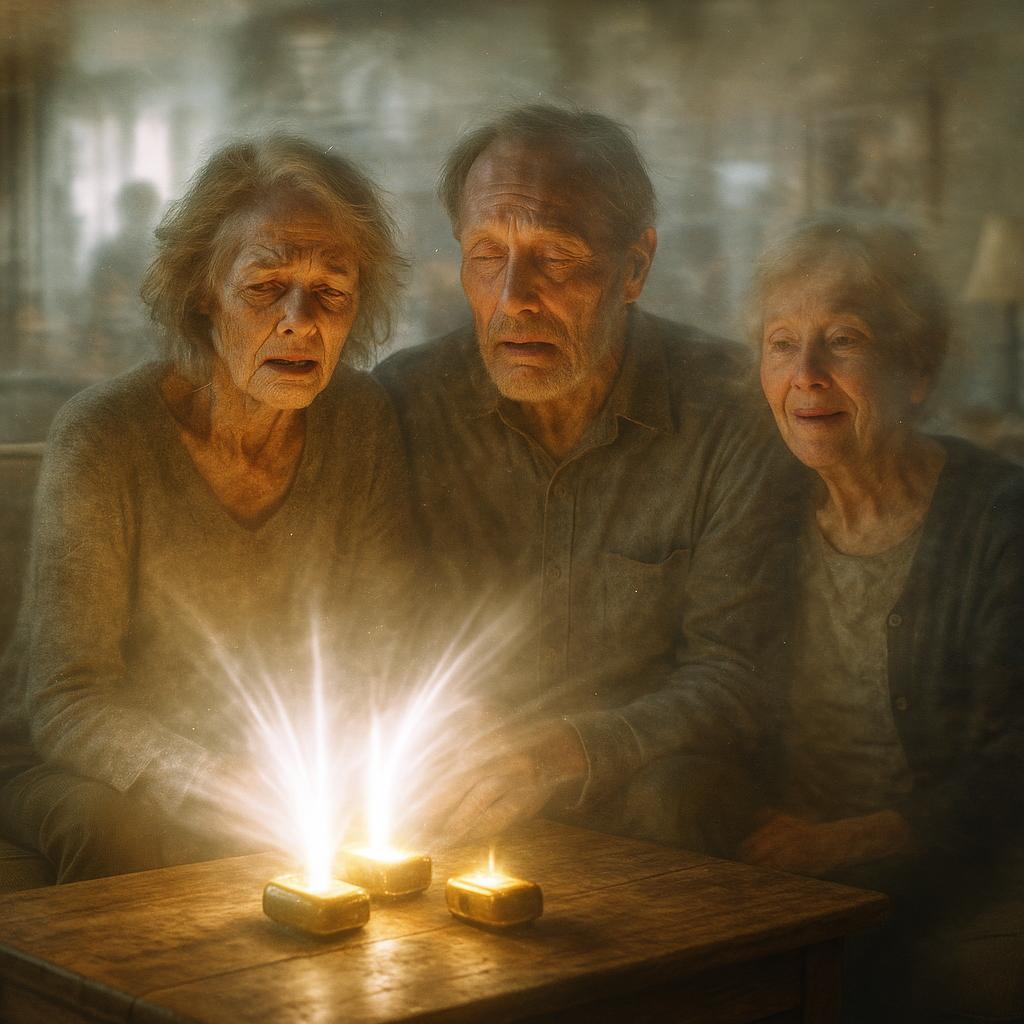 Image by RM AI
Image by RM AI
Hawthorne Lane, Restored
I woke up this morning with sunlight streaming through my curtains, feeling oddly rested. My phone showed it was the day after Edith's funeral—as if the past few weeks had been nothing but an elaborate dream. I rushed to my living room, but the device was gone. No brass-and-glass contraption, no notes, nothing. When I hurried over to Edith's house, I found it already cleared out for sale, not a trace of her meticulous labels or that mysterious wooden box. Even more bizarre? Patty came over for coffee, chatting about neighborhood gossip as if nothing had happened. Not a single mention of time devices or reset protocols. No Eleanor, no Thorne, no reality fractures. But as I walked down Hawthorne Lane later that afternoon, I noticed subtle differences. Lila, who I thought had been erased from existence, waved cheerfully from her garden. The neighborhood felt more vibrant somehow, colors slightly richer, people's laughter a bit more genuine. In my own garden, I discovered a plant I'd never seen before—delicate stems with clockwork-like flowers that opened and closed with the sun's movement. Most telling of all was what I found on my mantel: a single photograph I have no memory of taking. It shows Edith and me at a garden party that never happened, both of us smiling like we're sharing the world's most important secret. And maybe we are. Sometimes when I'm half-asleep, I swear I can hear Patty and Edith laughing together, as if they're watching over Hawthorne Lane from somewhere beyond time itself.
 Image by RM AI
Image by RM AI
KEEP ON READING
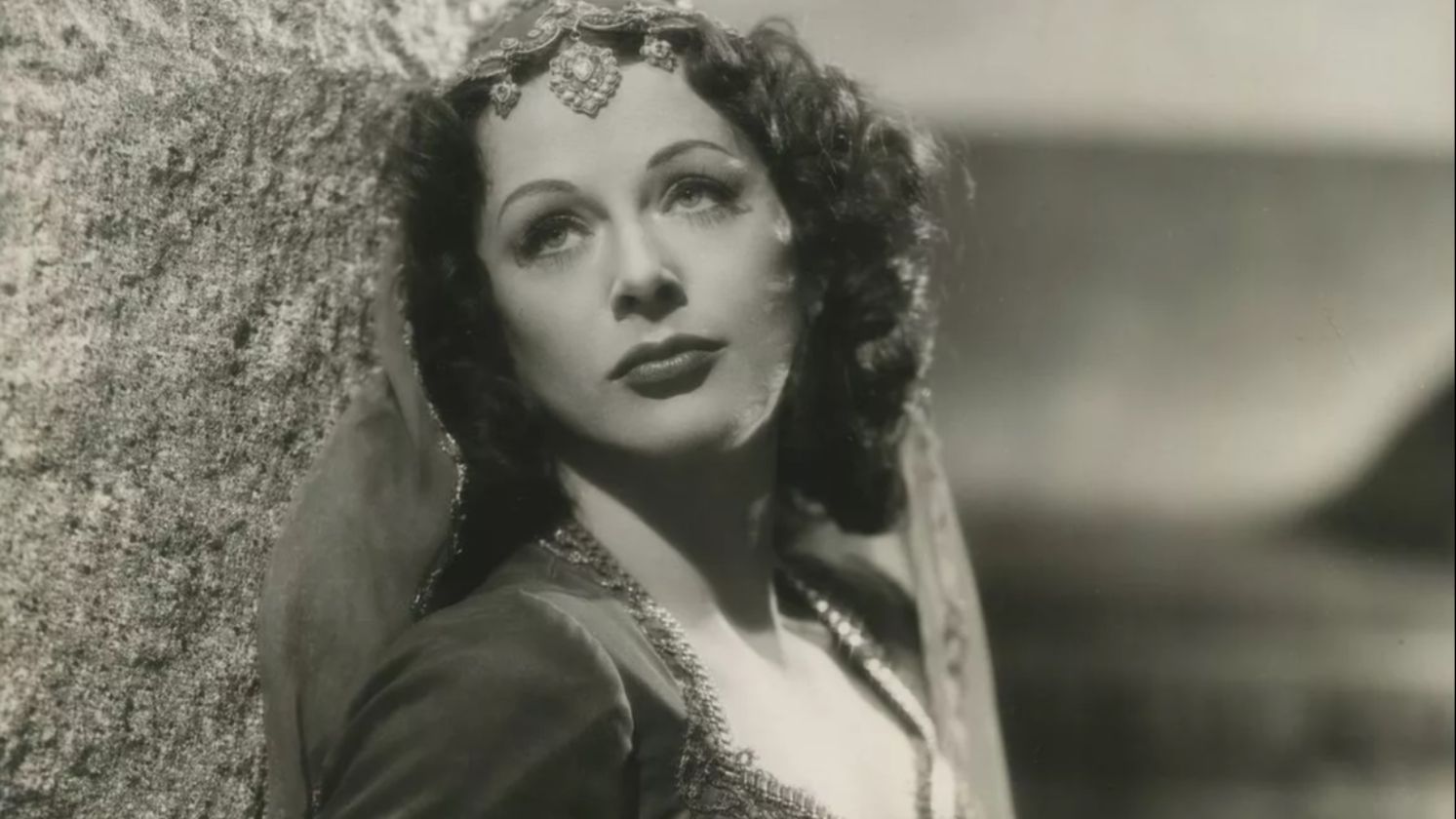
The Hollywood Starlet We Have To Thank for Wi-Fi
MGM / Clarence Bull on WikimediWhen you think of Hollywood's…
By Rob Shapiro Nov 27, 2025
The Most Misunderstood Man In The World
Unknown authorUnknown author on WikimediaThroughout history, there have been many…
By Farva Ivkovic Nov 26, 2025
How The Deepwater Horizon Oil Spill Actually Happened
Unknown author on WikimediaYou've probably heard about the Deepwater Horizon…
By Christy Chan Nov 26, 2025
10 Of Rome's Greatest Emperors And 10 Of The Worst
You Can’t Win Them All. An empire that lasts for…
By Breanna Schnurr Nov 26, 2025
How Sicily Became Synonymous with Organized Crime
Katherine Bowers on PexelsSicily is a beautiful island with sun-soaked…
By Emilie Richardson-Dupuis Nov 26, 2025
Jesters & Jokers: 20 Ancient Comedians That Tickled and Terrified…
The Fools Who Spoke Truth to Power. Court jesters weren't…
By Cameron Dick Nov 26, 2025
